The Character Development of Hikigaya Hachiman in OreGairu
The tale of Hikigaya Hachiman in OreGairu was one where self-discovery stood paramount. A story which implied a caterpillar-like figure creating a cocoon to vouchsafe his social standing through isolation with no shred of irony shed. Circumstances in his past life in middle school have skewed Hachiman’s worldview such that he saw his fate as naught but travailing and self-sacrifice with no hope of redemption in high school. Hachiman’s puppet-mistress instructor pulled him from this brink, kicking and screaming at first, by requiring him to interact with his classmates and to be useful. This interaction developed Hachiman’s character, which in turn propeled OreGairu‘s plot. Along the way, Hachiman questioned his worldview, then shattered it in the anime’s climax.
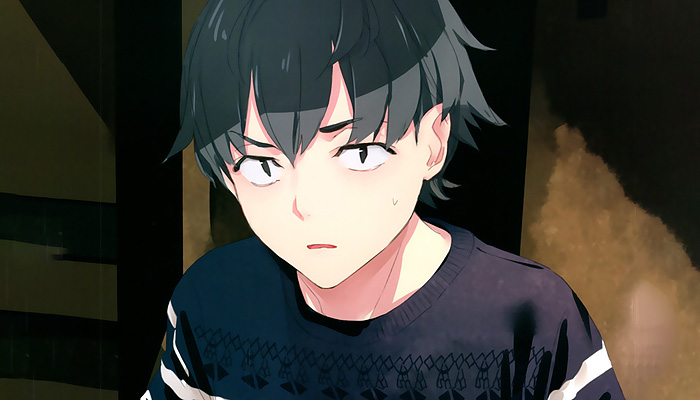
Given that OreGairu’s plot was driven by character development―Hikigaya Hachiman’s in particular―the focus shall be on how Hachiman progressed in his character through the first two seasons. An understanding of Hachiman’s modus operendi began with his life before high school. This established the foundation of his life as an isolated, misanthropic loner. The progression of OreGairu brought about Hachiman’s life being altered through more human interaction. This led to his world view being challenged ever increasingly, then shattered ultimately. The result was a new charter for Hachiman’s life and discovery of a truly genuine human relationship.
Background
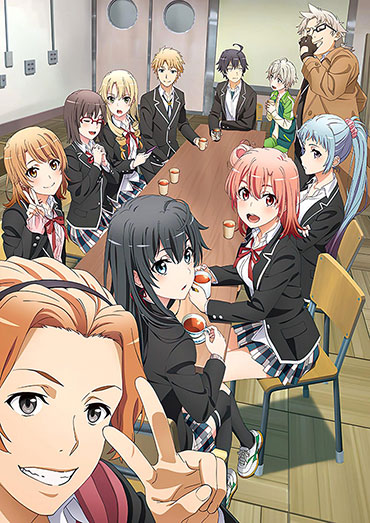
At the start of the series, Hachiman completely separated himself from other clubs or cliques. Hachiman wore this as a badge of honor, as a sign that he needs no one to survive. Hachiman’s teacher and counselor, Hiratsuka Shizuka held such contempt for this attitude―to a point of violence―that she required him to become a member of the Service Club. The Service Club’s main purpose―inasmuch as was discernable―was to serve Shizuka’s goals of creating social harmony and give high-caliber students an opportunity to shine. Throughout the series, Hachiman’s mental reservations broke down through interaction with his club members―Yukinoshita Yukino and Yuigahama Yui―and classmates and played more of a role in the school’s life. In the process, Hachiman uncovered people and their emotions at their base and moved closer to a genuine relationship. 1
Origins
For all that Hachiman did to wax poetic about his world view, the juxtaposition that little was known about his life prior to his life at Soba High School, and particularly in middle school struck as intriguing and palpable. But from what could be discerned, misery reigned paramount in Hachiman’s world. In the midst of a task where the Service Club helped Hachiman’s old friend Zaimokuza, by reading his light novel draft, Hachiman averred to his past enthusiasm of cosplay and fantasy genres. This struck Yukino and Yui as weird and creepy. 2 Any romantic interest he expressed to his female peers in middle school was likewise turned down, but in such a way that Hachiman did notice in his youth. 3
The inference―that a relation between these two things, such that girls did not like Hachiman because he liked cosplay and fantasy themes, and other nerdy things―certainly tempted the beholder. 4 Any other explanation would make one or both of these shrouds of Hachiman’s past life redundant. 5 Superficially, Hachiman’s desire to remove himself from greater society―if only school―was because he cannot interact with his society in any meaningful way. 6 The heart of the matter was that because of his past rejection, he viewed all of his desires in a negative light and therefore believed internally that he deserved to be alone all while sacrificing himself to his society in the hope that someone will help him. 7 Consequentially, though he was not aware of this initially, he saw hidden motives in all actions, because all his actions have hidden motives. 8
This context permitted Zaimokuza and Shizuka to serve as effective foils to Hachiman. Hachiman wanted to escape from this past life and wanted to engage little with Zaimokuza―who held an obsession with anime culture―in the Service Club initially because he represented a shroud of his old, nerdy life. He engaged more once Yukino and Yui, the other Service Club members, saw a glimpse of this past life and once Zaimokuza submited a light novel for review, of which was summarily panned. 9 If the initial difficulties and pressures from Zaimokuza percolated from below, the initial difficulties and pressures from Shizuka emanated from above. Shizuka’s referencing and interest in Shounen Manga, a cousin world to the fantasy Hachiman once enjoyed, combined with Hachiman’s truculence made Shizuka an early thorn in Hachiman’s side. Her early violence directed toward Hachiman personified Hachiman’s own inner desires retaliating against him and grasping for any scrap of attention so desperately needed from them. 10
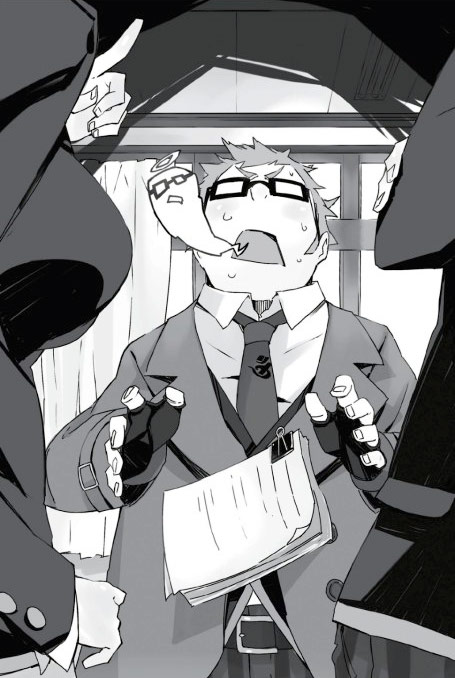
Further, Soba High School’s efforts to hold summer camp for elementary school children―particularly with the ostracized elementary-age girl Rumi― illuminated Hachiman’s distant, dim past and served as a microcosm of their relations with Hayato and his clique. Rumi tried to cleave to a group of fellow girls for friendship and a happy life, to no avail. The girls’ clique did not want Rumi to associate with them. Since none of her other classmates took notice of her, Rumi found herself isolated with no companions and no amity with anybody her own age. The Service Club and most of Hayato’s Clique saw the problem and wanted to help Rumi. However, when clique members put forth a prospective solution, Yukino and Hachiman both put forth reasons for why these proposals would not work and could further damage Rumi. In these discussions, Miura stood out as the only person that refused to offer any kind of support. She reasoned that it was easy to get along with people, and that if Rumi had difficulties, that it was therefore all her fault. Yukino berated Miura, to a point where Hayato stopped any public discussions. Yukino further scorched Miura in private for half an hour, and left Miura in tears. 11
Ultimately, the Service Club with Hayato’s clique engineered a hostile social situation against the clique that spurned Rumi. In their capacity as summer camp leaders, they created a haunted house, where they pitted the elementary school clique members against each other. They did not anticipate, however, Rumi’s actions that saved the clique from the haunted house and social ostracization, even at her own social expense. The summer camp events illuminated, matched and mirrored Hachiman’s life, in that he experienced this kind of treatment when younger, and even to his point in life. Rumi’s relations with her classmates reflected Hachiman’s relations with his, and Hayato’s clique in particular. It reached into his psyche, where he felt he needed to help her, which in turn, foreshadowed his path and fostered a desire to help himself. 12
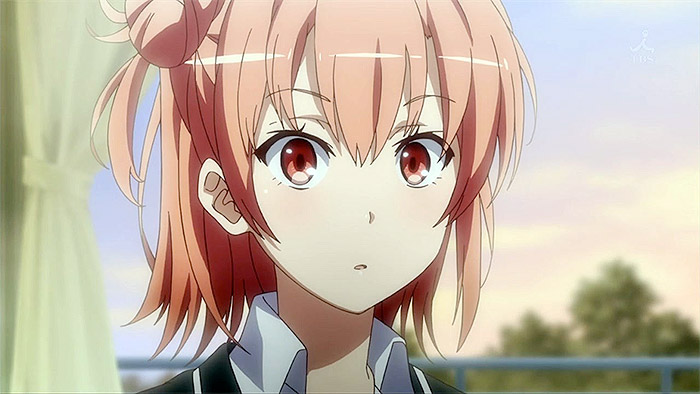
Yui faced the full brunt of Hachiman’s self-sacrifice first from events originally shrouded in mystery. As revealed in flashbacks, Hachiman saved a dog from being injured or killed from a limousine. 13 Unbeknownst to him at the time, the dog that he saved belonged to Yui and the limousine belonged to Yukino’s family. 14 When Hachiman learned that the dog that he saved belonged to Yui, he told her not to force herself to be nice to him because of saving her dog. 15 This caused Yui to leave the Service Club out of a myriad of feelings, such as confusion, frustration and sadness. 16 When Shizuka tasked both Yukino and Hachiman to find another club member, Yukino endeavored to regain Yui as a club member with Haciman’s assistance. Only when Yui formally came to the Service Club to commemorate her birthday and to thank her for all the work she did for the club did the dispute become clarified to Yukino. When Hachiman expressed that he believed Yui was just doing what she was doing to be nice to him out of pity―again showing how little he thought of himself―Yui exclaimed that she never thought of things that way, and just wanted to get along with everybody. Yukino resolved the dispute by pointing out that no one wronged anyone, that therefore, no apology was needed for either Hachiman or Yui, saying that Hachiman and Yui can have a new beginning. Thus, Yui rejoined the Service Club. 17
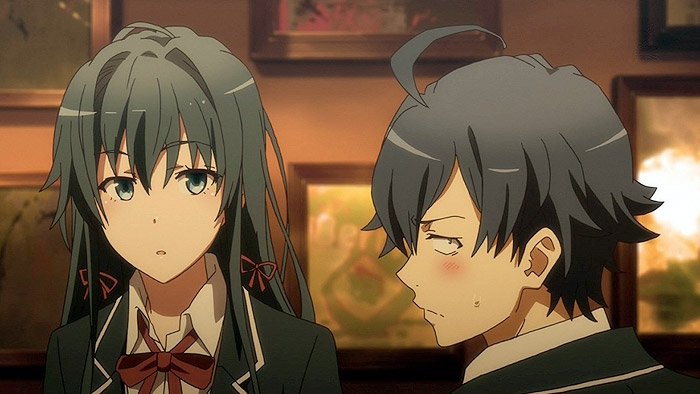
Yukino, on first meeting Hachiman, did not know what to make of him. This caused Yukino to fear and loathe him initially. 18 Beyond this, however, Hachiman’s perplexing nature made some of Yukino’s deportment toward him as perplexing as inconsistent. Yukino flatly rejected Hachiman’s overture of friendship, saying that there was no possible way that they could be friends. 19 The less-than-cordial relations changed tides upon Yui’s aforementioned departure from the club. Fearful though she may have been, Yukino felt that she needed Hachiman’s involvement in order to bring Yui back into the club. Thus, to the surprise of Hachiman, Yukino asked Hachiman to accompany her to the mall in order to plan and buy gifts for Yui’s birthday and to thank her for the help she gave to the Service Club. To Yukino’s greater surprise, Hachiman accepted her invitation. Hachiman’s sister, Komachi also came along, which brought some added comfort to both Hachiman and Yukino. 20
Yukino’s and Hachiman’s mall excursion made apparent that Yukino brought Hachiman along to help select a present for Yui so that they both could express their thanks to Yui properly and to wish her a happy birthday. As Yukino, Hachiman and Komachi entered the mall, Komachi conveniently disposed of herself. When Hachiman called Komachi to bring her back, she simply said that she had things to do, and that he could handle finding a gift for Yui with Yukino’s help. When Haciman pressed Komachi further, Komachi complained that her older brother could not take a hint. Komachi’s slyness did not go unnoticed by Hachiman, but he was powerless to change the inevitable. 21
Hachiman proceeded with Yukino as if things were completely normal, and both went to the cooking section of a department store. Yukino modeled a cat-themed apron before Hachiman in order to solicit a critique; and Hachiman gave a positive appraisal. Yukino took the compliment but said that she was asking how it would look on Yui. On this front Hachiman gave a pointed assessment, that Yui would look better in something that looked more stupid and frilly. Though Yukino did not care for the way that Hachiman expressed his critique, she could not find any fault as to the raw substance therein. Thus, she purchased a frilly pink apron as the Service Club’s gift, and also purchased the cat apron for herself. Hachiman’s observation―presumably because she purchased it at Hachiman’s prompting―that she bought the cat apron drew only a cold, grimacing, pointed stare from Yukino. 22
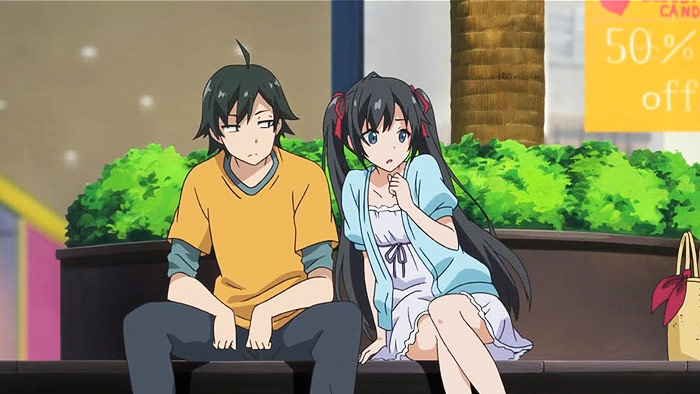
Later, Yukino’s sister Haruno saw and greeted both Hachiman and Yukino. Haruno presented herself to Hachiman as a cheerful, outgoing, engaging girl. Ever watching his back, this normally disarming approach by Haruno had no effect on Hachiman. Indeed, Hachiman said to Yukino that she put forth a façade, and Yukino appreciated Hachiman’s prescient perception. Hachiman’s weekend excursion to the mall with Yukino proved to be the foundation and the gateway to Yukino knowing Hachiman―and therefore losing her fear of him―and Hachiman knowing Yukino. 23
Yukino first discovered Hachiman’s self-sacrificial side in the course of their work on the Cultural Festival Committee. Yukino and Hachiman both held positions on the Cultural Festival Committee. Others proposed that Yukino become the committee chair, but curiously, rejected the position. Even in this refusal, because the president showed herself as completely clueless to committee governance, Yukino executed most of the duties and responsibilities of the presidency. Haruno’s intervention in stressing that the President should relax and take many breaks from her duties only added to Yukino’s duties to the point of physical exhaustion and illness. 24 At Yui’s behest, Hachiman went with her to Yukino’s apartment to make sure she was otherwise well. While there, Yui offered her assistance and Hachiman even went so far as to say that the way she approached maintaining the committee was incorrect. Though Yukino appreciated these offers she insisted that she could handle the workload. 25
After Yukino recovered, the Cultural Festival Committee considered what title theme it should give to its festival. The diverse selections proposed disgusted Hachiman. Hachiman expressed his disgust with his own theme proposal titled Hito (人). 26 He explained that the two strokes that make up the Kanji character are supposed to represent two people supporting each other, but that invariably it resulted in one doing all the work while the other rested on the one working. He exclaimed that this presented itself as the perfect theme because this committee ran precisely in this way. True to self-sacrificial form, Hachiman’s words shocked the other committee members. Yukino chuckled to herself at Hachiman’s presentation―presumably sympathetic to it―then proceeded to reject the proposal and had the meeting adjourned to the next day in the matter of the proposed theme. Other committee members grumbled at Hachiman’s intervention after the meeting adjourned and asserted that Hachiman just wanted to be lazy. 27
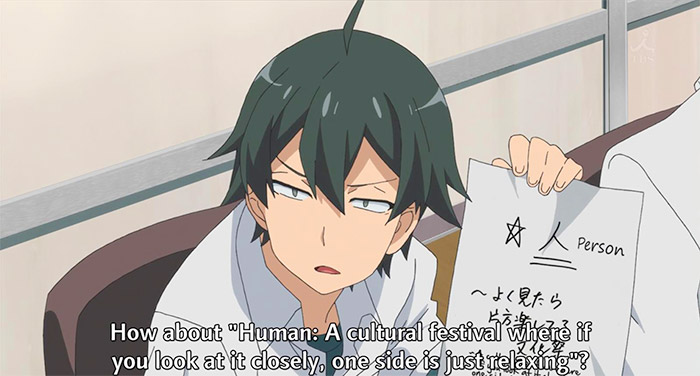
Hachiman’s self-sacrificial desires did not cease. The Cultural Festival plans called for the Committee President to announce winners for a competition. The President seemingly disappeared right before she was meant to make this announcement on stage. Thus, the rest of the festival organizers stalled for time and sent others―of whom Hachiman was one―to look for the President. With well-placed sources from his friend Zaimokuza, Hachiman found the President on the rooftop of the school being consoled by her friends who implored her to go back to the festival. In media res, Hayato appeared; he discovered the President’s hiding spot from well-placed sources that happened to be in the vicinity. Hayato joined in the chorus of encouragement to the President that she may be motivated to return to the festival. Then, Hachiman made his move: he berated the President by saying that she was not qualified for the position and only committed to the presidency to serve herself. The President and her friends expressed their contempt for Hachiman, then returned to the festival. Hayato, out of fury, went so far as to hoist and thrust Hachiman against a wall, and after the President’s departure wondered aloud why Hachiman must always operate in the way he did with the President. 28
Hachiman’s efforts succeed in what he wanted to accomplish: the President returned to the festival, and concluded the event in a public appearance. His efforts also succeed in ensuring that he received no credit for this and gained only infamy to his name. After the festival’s conclusion, he encountered Yukino in their club room. She noted that Hachiman in his actions became the most hated man in their school. Although she repeated that she and Hachiman can never be friends, she expressed herself around Hachiman in a more comfortable, amicable way and appeared more relaxed around him. This demeanor hinted at what she next expressed, and what Hachiman’s acts confirmed: that though she did not know Hachiman before, she knew him now. The small but clement smile and the soft tone with which Yukino expressed herself belied that Yukino understood that Hachiman was a man that gains results through sacrifice of himself and that she was happy about his efforts at the Cultural Festival that caused so much anger, because he saved the show and created the conditions for the show’s success. She also has borne in mind that his self-sacrifice helped the Service Club and her personally with this specific purpose. 29
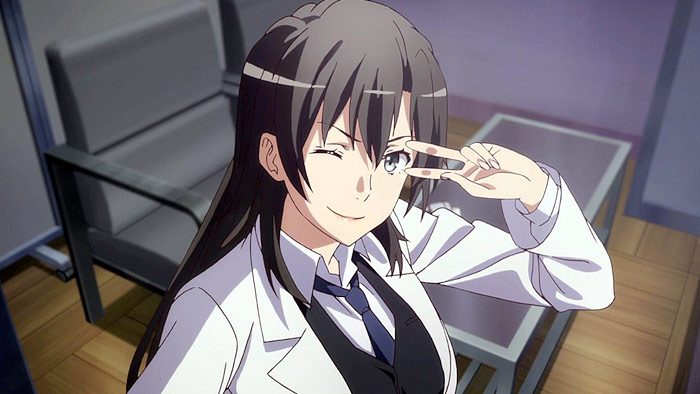
Though he did not know at the time, upon the execution of his actions and the festival’s conclusion, Hachiman began his true Odyssey into his underworld, and Shizuka welcomed him there with open arms. Shizuka first revealed―at first implidedly―her awareness of Hachiman’s tendency toward self-sacrifice after the festival. She indicated that she could not praise his actions despite the clear production of results; that helping others was no reason to hurt himself. Then, in her first time showing tenderness to Hachiman, she said that others felt hurt by this kind of act and that it may prevent him from helping who he really wanted to help. 30
Hachiman’s World Challenged…
The aftermath of the Cultural Festival signified a decisive break in continuity of the life he knew before. Though Shizuka always knew Hachiman’s potential, she never previously saw any signs of it in a meaningful, dramatic way. His beratement-as-self-sacrifice directed toward the committee president proffered to Shizuka the first sign. Here, Shizuka knew he would be linked with reality inextricably. Hachiman cleaved to a lingering belief that he deserved to be alone but removed the basis for his own belief―isolation―in one swift, humiliating apparition against the committee president. In doing so, Hachiman became a dependent on society and others company, which he later acknowledged, if only to himself. 31 Despite withholding her praise, Shizuka granted Hachiman her comfort, for though she did not say it, she saw Hachiman’s change. In seeing this, she revealed herself more explicitly as a benevolent puppet-mistress who saw her energies on Hachiman beginning to bear fruit. It was in this vein that Shizuka encouraged Hachiman. 32
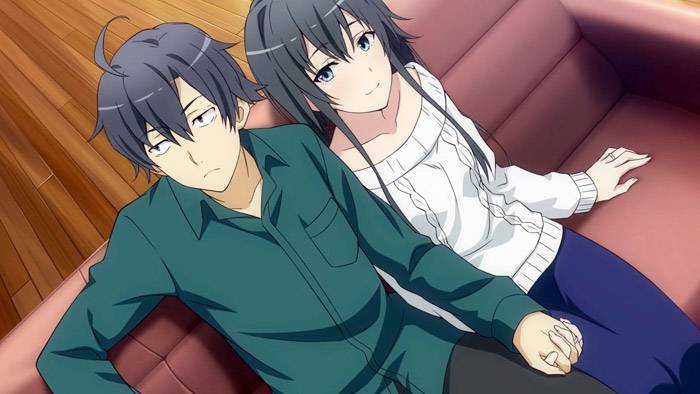
Yukino’s shift in deportment toward Hachiman proved even more dramatic. She began her relations with Hachiman with no expectations and naught but dread at even having to have dealings with him. 33 Though there are flickers of Yukino perceiving Hachiman to have more heft in his abilities than she previously estimated, such as his perceptive nature detecting her sister Haruno’s true nature, 34 her baseline treatment of Hachiman remained fundamentally unchanged, even accounting for her flickers of kind gestures toward him in organizing the Cultural Festival. 35 Only after the Cultural Festival, when Yukino declared that he now knew Hachiman did Yukino imply a fundamental shift in relations. 36 Yukino confirmed this shift in rejecting help from Tobe and Hayato because Tobe initially rejected having Hachiman hear his request. She and Yui made it clear that any help from the Service Club was a package deal with all of its members, and confirmed implicitly her concern for Hachiman through her rejection. 37
Prior to the festival, only Yui showed any closeness toward Hachiman and this was because he saved Yui’s dog, Sable. Thus, as far as Yui was concerned, he could be engaged with his surroundings because he already demonstrated it to her. Indeed, the way that Yui treated Hachiman after his sacrifice to save the Cultural Fesival was hardly any different than before. 38 Curiously, aside from the occasional moment alone with, as with the fireworks festival, 39 or an admonition from Yui, Yui’s relationship with Hachiman remained in stasis, with no development since their reconciliation. 40
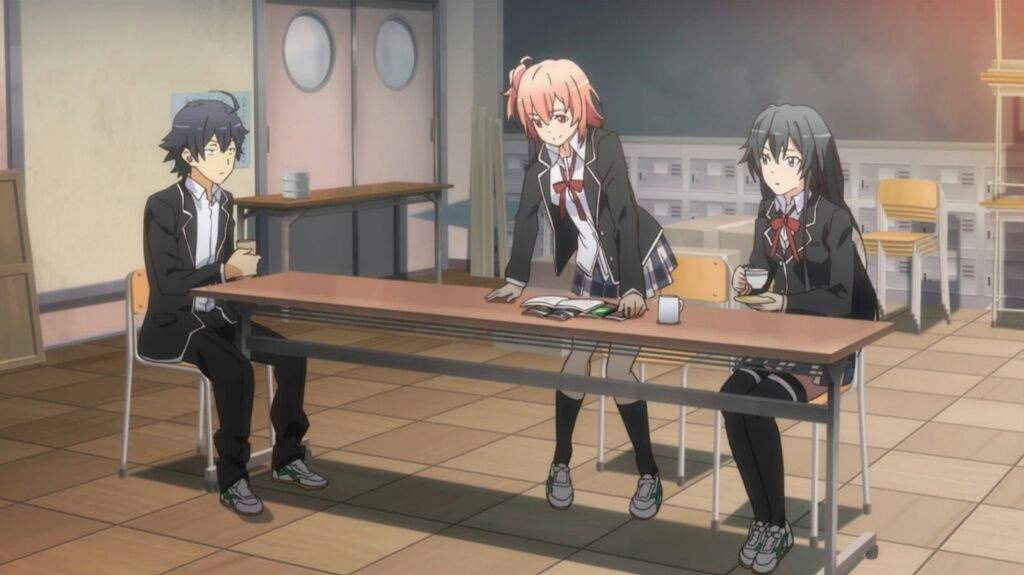
Both Yukino’s newfound amity and Yui’s static relations with Hachiman absorb a sudden, massive jolt that affected these relations in far-reaching ways. An embarrassed Tobe―in part because he had to express this to Hachiman in the Service Club Meeting, at Yukino and Yui’s insistence―with Hayato’s apparent support, wished to offer a love confession to a girl named Ebina. 41 The Service Club plotted to find a way for Tobe to win Ebina’s heart on the upcoming school trip to Kyoto. As they plotted, however, there were warning signs that should have served to foreshadow what was to come. When Tobe asked what Ebina thought of him, Yui relayed that Ebina thought he was “a nice guy.” Hachiman regarded this―correctly as it would turn out―as a death sentence for Tobe’s love prospects. Further, after Hayato and Tobe left the Service Club’s meeting room, Ebina entered. In her performative, garbled comic relief, she expressed her desire to keep the status quo intact. No one except for Hachiman seemed to catch what she truly expressed. 42
Unfortunately, logistical and physical limitations circumscribed the club to surreptitious means of engineering situations where Tobe and Ebina would be in the presence of each other. Hachiman specifically drew the ire of Miura about this, who insisted that she previously tried setting up Tobe and Ebina but could not unite the two romantically, so she gave up. She explained that multiple boys have offered love confessions to Ebina only for her to turn them down so gently that no one noticed. She impressed―almost demanded―upon Hachiman to stop setting the two up romantically. Hachiman defended himself by saying that Hayato came to them for help with Tobe. Upon hearing that her paramour consigned Hachiman’s charter of the whole affair, Miura dropped her own objections and adopted Hayato’s views as her own. 43
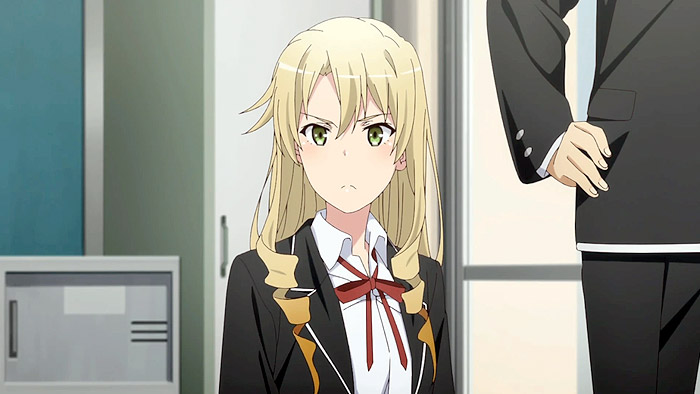
In hindsight, Miura’s confrontation served as a harbinger of things to come. When Hachiman pointedly told Hayato that he did not appreciate his lack of cooperation, Hayato confirmed what Miura told him. Hayato said that he had tried to dissuade Tobe from further pursuits toward Ebina, but his hints to Tobe fell on deaf ears. Hayato expressed an interest in keeping his friend circle’s status quo relatively intact and that he would prefer to let things run their natural course with as little disturbance as possible. Hayato also believed that in this things could change for the better because relationships can change. Hachiman inferred from this that Hayato’s preference in associating with people was along a superficial nature. In this vein, Hachiman accused Hayato of being selfish. Hayato then put the ownness on him; he asked what he would do in this situation. Hachiman weakly demurred at this suggestion because he was neither Hayato nor Tobe. Hayato closed this conversation in emphasizing that he was absolutely the last person he wanted to go to for help. 44
Even against all these signs Tobe met with Ebina along a pathway in the bamboo forest in Kyoto, with a dimly-lit ambiance. Both Hayato’s clique and the Service Club posted themselves where they could watch events unfold surreptitiously. The result of polite rejection could be nothing other than preordained from the start. Even so, only Hayato and Hachiman knew of this outcome among the spectators going into Tobe’s love confession. Even after Hachiman made Yukino and Yui privy to this information, both gave Hachiman carte blanche to commit to the actions he believed best. Neither they, nor Tobe or Ebina, nor any other person in Hayato’s clique―save for Hayato himself―expected that Hachiman would spring from his hiding spot, approach Tobe and Ebina, and offer a fake love confession to Ebina. Even so, he did. 45
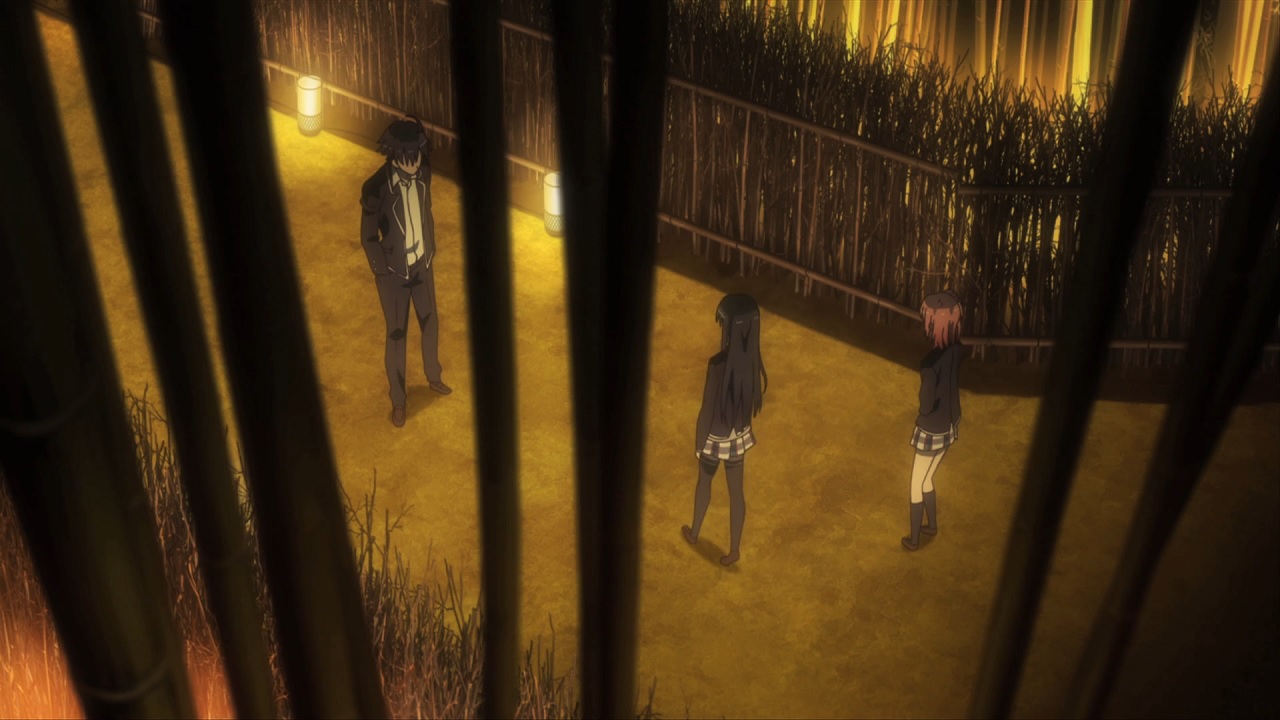
Hachiman’s ‘confession’ had the desired effect: Ebina rejected it because she was not ready for any such relationship. Tobe was relieved that he was not the one embarrassed by rejection and―per Hayato’s hint―that there was still hope left for such a relationship in the future. Tobe not seeing the whole picture, however, thought what Hachiman said was what he really felt and vowed to win in his ‘rivalry’ with Hachiman. 46
Aside from the appreciation he later received from Ebina in keeping everything intact, his means of achieving the desired result received universal scorn. Hayato repeated that he hated that he had to ask Hachiman for help. Hearkening back to Hachiman’s actions at the Cultural Festival, the subtext indicated that Hayato hated asking for Hachiman’s help because he knew that Hachiman would resolve the issue by throwing himself to the wolves. Nonetheless, Hayato implicitly expressed that he had to go to him for help because he was the only one that would reliably resolve the issue, however distasteful he found his methods. 47
Yukino and Yui’s reactions to his act proved more concerning and held a more lasting impact. Yukino icily looked upon Hachiman, expressed that she hated how he did things but could not explain why. With this said, a development of feelings for Hachiman from the Culture Festival to this point proved a tempting explanation. 48 Her chilly glare contrasted with her infernal choler directed at Hachiman for his self-sacrifice. However, she could not articulate all this in this precise way in that moment. Thus, she stormed out of the scene in disgust. Yui showed more patience and understanding but proved an adequate rival to Yukino in expressing her distaste at Hachiman’s actions. She did appreciate that Hachiman resolved the issue with Tobe, where everything remained the same. With this noted, Yui expressed frustratedly and with a heavy melancholy that how Hachiman achieved the result was not right and that he should be more concerned about how others feel about him. She also rhetorically asked with this emotional charge why he saw so many social dynamics but failed to see how others feel about him. 49
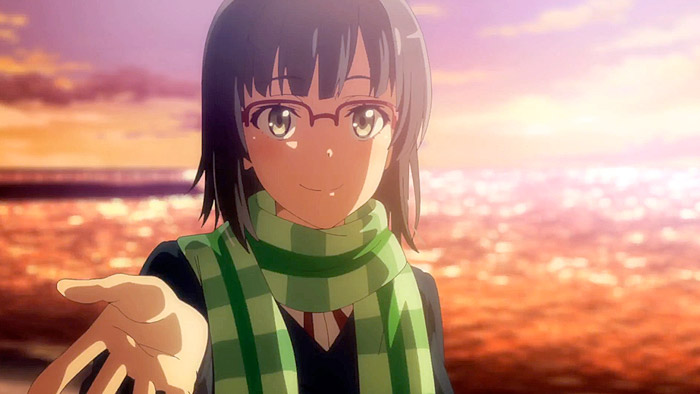
In the middle of all this, Hachiman demurred in his explanation, explaining in the face of all these objections that what he did was the most effective way to resolve the issue brought to the Service Club. His inner monologue told a different tale. He acknowledged to himself that he simply put effectiveness as paramount as an excuse, in order to enable him to commit to action. He further acknowledged inwardly that he was lying to himself and that he did what he hated most in the world, and thus, was becoming what he hated. In Hachiman’s later talk with Ebina, she explained that she liked who she was, where she was in life, and her friends and associates. For this reason, Ebina hated herself. This served as an effective, external, verbal foil to Hachiman because this was how he felt about himself in that moment and from the start. Hachiman discovered that this was the reason that people put up a front for their lives. He found that he did this in his own life in such a radical way that he denied himself his most inner desires. This made him the biggest liar of all. 50
The morning after Hachiman returned with his class from Kyoto, his breakfast with his sister Komachi portended and mirrored what was to come. Komachi wanted to know if all went well for Hachiman in his trip. Hachiman gave vague answers, and when Komachi asked about Yukino’s and Yui’s company specifically, Hachiman became defensive. When Komachi presumed―correctly―that something happened between the three, Hachiman complained that she was getting pushy. This caused so clear a disturbance in the domestic sphere that even Komachi’s and Hachiman’s pet cat sensed something amiss and felt disturbed. Komachi ended the chat-turned-argument, left the room and exclaimed behind closed doors that something happened to Hachiman. 51
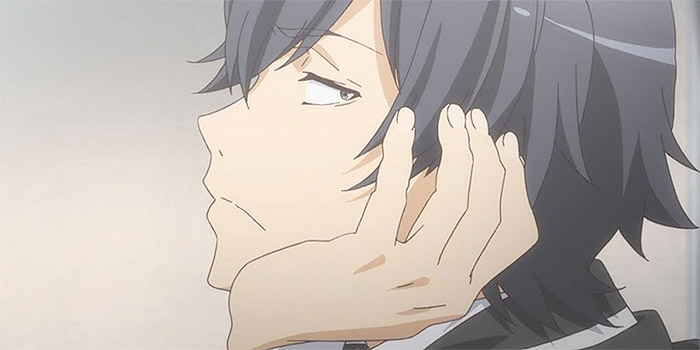
The atmosphere of the Service Club proved equally unwelcoming. Yui and Yukino audibly engaged in conversation prior to Hachiman’s entrance. When Hachiman entered and took his seat, all sign of conversation ceased, as if it disappeared into the ether. Yukino stopped serving tea to the club members where previously she followed the example of a gracious sovereign in that she served tea with bounty and generosity with the rest of the Service Club. 52 Indeed, she proved to be as stingy as of late with her tea as with her conversation and her overall deportment. Yui transparently tried to keep a happy front for Hachiman and to keep everything in the club pacific. Even so, the tension from the silence remained until a new task arrived before the club. 53
Enter Isshiki Iroha with Hiratsuka Shizuka. Iroha, a first-year high school student, came with Shizuka to the Service club because some of her classmates submitted her name without her consent to stand for the Student Council Presidency as a prank on her. Compounding matters, Iroha ‘stood’ as the only candidate on the ballot, making her ‘candidacy’ a confidence vote in effect. Since Iroha did not want the job, Shizuka wanted the Service Club to find a way to prevent her from getting the presidency. 54

Hachiman and Yukino came to an impasse in their differing, conflicting solution, and both play to their own tendencies. Hachiman proposed a solution that would be effective in achieving the desired goal. His plan involved having someone give a campaign speech that was so tone-deaf and bad that it sunk Iroha’s candidacy by failing to attract enough of a vote share to assume office. The underlying subtext in Hachiman’s plan was that he would sacrifice himself by making the speech that would sink the battleship that was Iroha’s candidacy. Yukino, playing to novel trends lingering from the Tobe Incident in the Kyoto bamboo forest, objected to Hachiman’s plans. She pointed out that it would not necessarily work, and even if it did it would be humiliating to Iroha and all involved. She perceptively and acutely read the subtext that Hachiman conveyed about who would give the speech. But in the process, she expressed her objections in a way that packed an emotional charge and a melancholy―as if to express that she felt hurt―coming from a place both of love and loathing that Shizuka pointed it out to Yukino. 55
After composing herself, Yukino proposed that someone else launch a candidacy to challenge Iroha and have that person win. Subtextually, Yukino planned to stand against Iroha for the Student Council Presidency and win the prize spot for herself. She wanted to remove herself from the shadow of her more gregarious sister, Haruno. Yukino thought that this was the way to do it, since Haruno never held office as Student Council President. But Hachiman did not know this yet; Haruno told him this later in the day, in the evening. As such, Hachiman rhetorically asked: would not someone have already announced a candidacy if that person was interested? Given the pointedness of his question, this was directed toward Yukino. 56
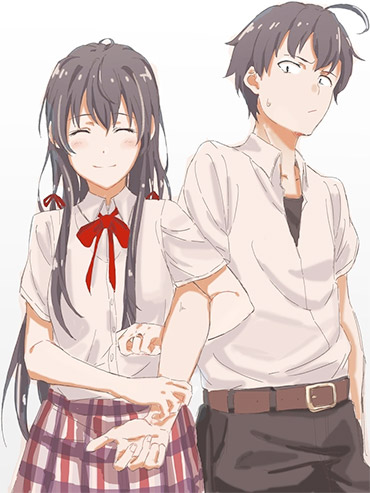
Ironically, Yukino engaged in the same thought process as Hachiman: both proposed a plan with a hypothetical person that would involve themselves being the main driver and catalyst to their own plans as a pretextual front to advance their own desires. The issue in part stemmed from both Hachiman and Yukino not having a clear idea of what their own desires were. Given the calm-before-the-storm moment, where Yukino and Hachiman helped Yui consume all the treats that she bought while enjoying each other’s company in Kyoto, 57 it was clear that both want human companionship where all within the relationship can talk about their thoughts and feelings freely and frankly in the in each other’s intimate, friendly company. This moment in Kyoto represented precisely this. Both Hachiman and Yukino wish to attain this in perpetuity. The issue remained that neither have, nor know of how to gain, the means to this noble end. This conflict between the two, recapitulated at the end of the episode underscored this point. 58
After the meeting’s conclusion and Hachiman’s withdrawal from the Service Club’s classroom, Shizuka talked to Hachiman for didactic ends about the situation involving Yukino. She understood that he wanted to help and be constructive, and liked this. Her concern was that Hachiman implemented self-harmful means in order to achieve the end of aid. She explained that with these means, when Hachiman reached a pointed where he truly wanted to help someone, he may not be able to do so. Within the subtext, Shizuka hinted toward Hachiman not being able to help Yui or Yukino. This implied that Hachiman held a motive to help at least one of the two girls. Shizuka was saying that with the way he operates, he could preclude himself from helping either Yui or Yukino. 59
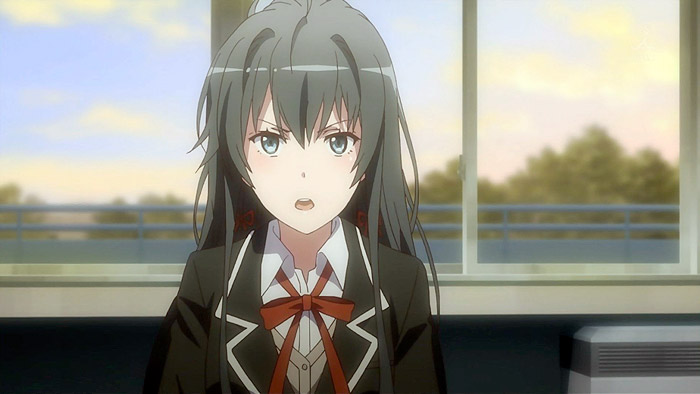
True to form, Yukino expressed to Shizuka later that she wanted to stand as a candidate for Student Council President, in fulfillment both of Iroha’s request and her own―to that point―tacit desires. Shizuka brought this information to Hachiman. She explained that teacher and student alike would like her presidency and what it could bring. All the same, Shizuka knew it would bring much trouble to the Service Club, because she asked Hachiman what would he do, impliedly asking what he would do about it. He began by confronting Yukino about the plan. Yukino, in beginning their third battle about the election, said that she could handle the work of President and that the job of President of the Service Club held little strain, so she could hold both positions simultaneously. Hachiman affirmed that he stuck to his plan. Yukino gave a new avenue of attack: that others did not care enough about what Hachiman had to say in order to get the negative result he desired. 60
Yui walked home with Hachiman, and in the process, began a new routine and confided in Hachiman all of her thoughts on matters of importance, like the election. Yui told Hachiman that she will run for Student Council President too. She stated that everyone else acted selfishly in handling the election, and that she may not be as good of a candidate, but that she knew she had nothing. She felt it was her only choice: to rely on herself and not on others and try to gain the presidency all on her own. She knew and said that if Yukino became Student Council President, that it would be the end of the Service Club that she so loved. This was the only way that she saw to save it. 61
At this point, Hachiman saw a real urgency to election matters. Now Hachiman had a clarity that a status quo needed to be maintained, at least in this moment. Whatever else happened, the structural and social integrity of the Service Club needed to remain intact. The election represented an existential threat to this. 62
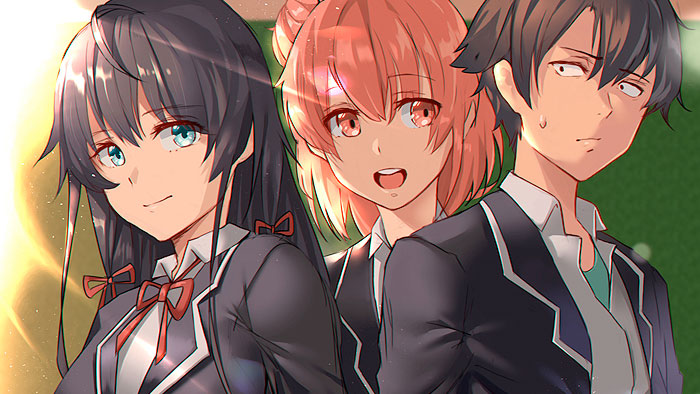
In order to facilitate these ends, Hachiman called a meeting to ensure that neither Yukino nor Yui became Student Council President. He knew that Yukino’s objections to his original plan held water, but also saw decrepit atrophy if Yukino or Yui had their way. 63 In accordance with this, Hachiman called Zaimokuza to find a way out of the impasse. Komachi, by now with her relations with Hachiman restored, joined the meeting too and brought two of Hachiman’s friends with her. She expressed concern over the Service Club and she wanted Hachiman to get things back to normal. This provided Hachiman a superficially plausible cassus to involve himself, which later provided a relevance that loomed larger than his life. 64
At this point, Hachiman saw that his way out of the election fiasco was to persuade Iroha to embrace the Presidency. Thus, the plan executed, by Hachiman and Zaimokuza primarily, began with creating a social media account that put itself forward as a support group for Hayato to become Student Council President, thus banking on Hayato’s popularity. The support group garnered one third of the entire student body. Next, Hachiman, who controlled the account, changed the account name to the Isshiki Iroha support account to make it seem like Iroha garnered a massive show of organic support. Finally, the day after, Hachiman pitched the idea of becoming president to Iroha. 65
He started by saying that people would laugh at Iroha, but that Iroha should get her revenge by winning and becoming president anyway. He also explained that since she was a club president, she could give an excuse that she had Student Council matters to handle if she did not want to deal with club matters or vice versa. Since she was a first-year student, no one would blame her if she did poorly. Further she had a support group―the one which Hachiman surreptitiously created and manipulated―that garnered one third of the school’s support. With all this argumentation, Iroha found Hachiman’s points irresistible. She accepted Hachiman’s proposal and became Student Council President. 66
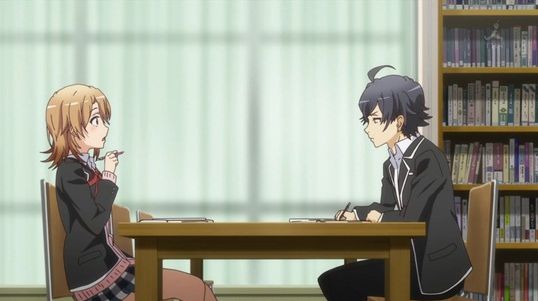
Seemingly from the ether, Hachiman created a solution that seemed to bring satisfaction―or at least the most begrudging acquiescence―to all parties involved in the Presidential Succession issue. Iroha seemed content to tread down the initially-sardonic path that fate had lain for her. Yui expressed private jubilation to Hachiman as she massaged his head and hair. Hachiman initially worried that he would be found out, that he used intriguing, underhanded means to achieve the result. Yui continued to express this effervescence even after she said that she knew of his plotting. She knew that he had to do what he did for her, which made her happy. Much to Hachiman’s annoyance, Yui exclaimed that he did his best. 67
Yukino gave her acceptance of Hachiman’s plans, but she made clear that it came only under duress. Yukino remained under the shadow of her sister and the Presidency would have been her chance to emerge from it. Yukino however, did not express this internal desire. As such, Yukino’s motives escaped Hachiman’s otherwise Tiresian perception and caused more resentment from Yukino to Hachiman in the process. She also objected again to his methods, and also gleaned that Hachiman operated in this way to preserve the Service Club’s status quo, which she took to heart. 68
In media res, Hachiman’s own motives became the story’s propellant, the driving force of the character and therefore the plot itself. Hahchiman by his own admission expressed that he missed something in how he executed his plans. That something was his own motives for why he acted toward a goal in the way he did. Hachiman’s reasons had no clarity beyond an immediate motivation, such as to keep the club intact. Dig deeper as to why Hachiman desired to keep the club together, and nothing could be found. Hachiman had no internal compass, no raison d’etre in his acts, no principal or personal motive for why he acted. Finding this compass, this raison d’etre, this principal and personal motive represented the struggle he endured in his immediate future. 69
…And Then Shattered

The first signs of inner guidance for Hachiman begin with mending his relations with his sister, Komachi, which provided foreshadowing of his recovery of his relationship with the Service Club. Hachiman apologized for his brusqueness to Komachi and told her what happened on his school trip to Kyoto, including his fake confession to Ebina. Komachi understood where her brother came from and how he acted regarding his self-sacrifice. She also noted, in a persistent theme, that the way Hachiman acted could cause people to feel hurt. In saying this, Komachi, the younger sister reached the same conclusion as the more deportmentally sagacious Shizuka and the people-pleaser Yui. In any case, Hachiman failed to heed either Komachi’s, Yui’s or Shizuka’s advice in his immediate future, with near-disastrous consequences. 70
At the Service Club, both Hachiman and Yui endeavored to keep up appearances of a status quo ante the Kyoto trip. In the club, Yui talked to Yukino for the sole reason of keeping everything in the club tranquil and to mask any tensions ongoing. Hachiman reflected more pensively; he looked upon the clique in his class and how the people within had such a harmonious relationship. He regarded the clique subconsciously as a possible way of learning how to repair relationships. 71
Iroha’s need for help on a Student Council matter brought matters to a head. Iroha went to the Service Club for help on a Christmas Event to be held jointly with Kaihin High School. Hachiman quashed any discussion on the matter among the Service Club. He seemed to feel responsible personally for Iroha having to do this job, since he made her Student Council President, in effect. Potential disputes no doubt came under consideration too. Instead, Hachiman offered to help Iroha in his own personal capacity and not as a part of the Service Club, which Iroha accepted. In doing so, he endeavored to make reparations resulting from the election affair, both to Iroha, for making her President, and Yukino, to prevent any further issues in the Service Club and to repay her for blocking her ascension to the Student Council Presidency. 72
Hachiman found himself and the Student Council immediately overwhelmed by a lack of competence and confidence combined with an ignoble stubbornness to stay the course from the first meeting of the Joint Christmas Festival Committee. The President of Kaihin’s Student Council, Tamanawa, sought to look impressive. He insisted on using Western concepts and business terms, not just as artifice but effectively a substitute for a substantive plan too. Tamanawa’s efforts resulted in a functionally moribund joint committee because Tamanawa focused so much of his efforts on brainstorming and incorporating all ideas, that the committee accomplished nothing substantive, other than the lion’s share of the work being pawned off on Iroha and her Student Council. When Hachiman attempted an intervention by whittling away at some suggestions and trying to establish some direction, Tamanawa blocked his advice on the grounds that it was not inclusive. Hachiman, unperturbed, then tried to use similar Western words and phrases to Tamanawa to get his way, only to have his attempt backfire, which resulted in more work for Iroha and her entourage. 73
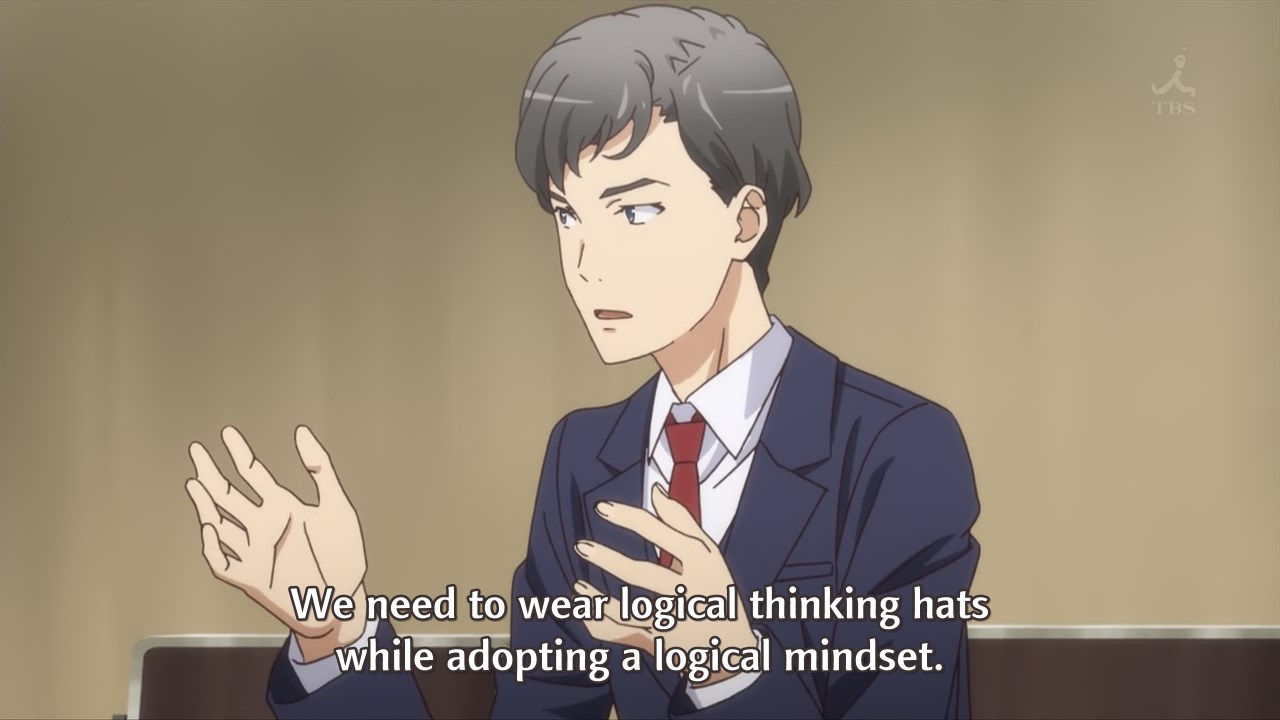
Hachiman’s rapid failure to wrest control of the joint committee―and thus have an already weak position deteriorate―served as a mirror image and portended what was to come in Hachiman’s most personal relations at the Service Club. Well into his time working on the Christmas festival, Yui approached Hachiman, and in discussions on their own lives, Yui mentioned that she knew that Hachiman was engaged with Iroha and the Student Council on the joint festival. Yui also mentioned to Hachiman that Yukino may have wanted to be President in her own right. Hachiman expressed, though half-heartedly, that he did not know if that was her true motive. Yui also wondered if Yukino would have actually accepted Iroha’s request before all of the acrimony as of late. Hachiman inquired as to whether Yui knew if Yukino knew of his efforts to help the Student Council. Yui said that she did not know because she never talked about him. 74
Hachiman discovered the answer to his own question later that day, in the evening, at the mall where he encountered Yukino upon happenstance while she finished her Christmas shopping. In their conversation, Yukino brought up Iroha’s request and that she knew that Hachiman was helping her with it. Cognizant of all the tumult with Hachiman as of late, Yukino encouraged Hachiman to take a break from the club. She believed that he only attended because of concern and consideration of both herself and Yui; that had always been his motive. Thus, Yukino expressed that Hachiman did not have to force himself to attend anymore. 75
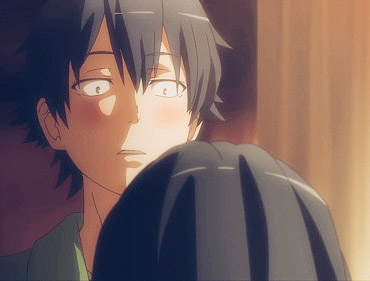
Amidst this, Yukino expressed her own doubts on how things have developed in the club and in her relationships at large. At the conclusion of Hachiman’s and Yukino’s conversation, Yukino felt prepared to sever all her ties to Hachiman. She believed that she put her life together, only for reality to prove her wrong. Though she did not expound thoroughly on her doubts, there they were. These doubts acted as a foil to Hachiman’s now-wavering fortress mentality. 76
These doubts came to the fore in a peeling back of his own mind from the dinner Hachiman had earlier. One of his classmates commented that he thought Hachiman to be cool because he simply worked without complaint. Hachiman simply created that perception as his façade. This was true of everyone around him. Even so, with his classmate making this superficial observation, the classmate unwittingly revealed the seeds of doubt into Hachiman’s mind now sprouting. The Christmas Festival had no central organization, and Hachiman could not find his way out from this impasse. Hachiman acknowledged to himself that he saved others in how he operated in the past. But in his situation, he found that results alone cannot relieve him of his difficult position. He knew on some level that he needed a change of method. Ultimately, he did not know where to begin. This was the source of his impasse. Given how the world that he knew thus fell away from him, he needed a revelatory breakthrough. 77
The Phoenix
The conclusion of his conversation with Yukino left Hachiman alone to tend to his thoughts. Shizuka quickly filled the void as she beckoned Hachiman from her sportscar and offered to take Hachiman home. Though Hachiman accepted, Shizuka also wanted to stop someplace to talk which he acceded to. The place where Shizuka stopped indicated her purpose: in the middle of a bridge in the late evening, where no one else was present. She wanted Hachiman to debrief her for her to gain more information and perspective. But she also knew from previous encounters from the Service Club and from extrinsic information that she gleaned from Yukino and other circumstances surrounding the club. Thus, she had a clear idea from what she wanted out of the conversation: she wanted to guide Hachiman to the right path for him. Thus, in using this extrinsic information, Shizuka showed more clearly than ever that she was Hachiman’s invisible hand made visible. 78
Hachiman began the interaction with his coffee and as Shizuka smoked, Hachiman commented that she looked cool. Shizuka affirmed this and said that it looked that way because she portrayed herself that way. Unwittingly, Shizuka’s words tied back to Hachiman portraying his own façade to his friend at dinner and to everyone generally. With this, Hachiman understood that everybody put up a front; and because everybody put up a front, other people do not show their true colors. This revealed a key device to advance Hachiman’s character and the story: that Hachiman had the ability to perceive and find another’s true self. Indeed, the core of Hachiman’s story was his strife to find Yukino’s and Yui’s true selves. This seemingly nonchalant moment served to indicate that this scene and the conversation within marked the climax of the anime. 79
Hachiman said that the Christmas Festival took a bad turn, in response to Shizuka’s inquiry. He explained that time appeared to be the major issue. Tamanawa and Iroha both feared failure on their own accounts. Thus, both distributed responsibility by soliciting opinions from the joint committee members and trying to implement every option given to them. This resulted in an apoplectic impasse. No decision had even been made on who would lead and who would be held responsible. This was wrong according to Hachiman. 80
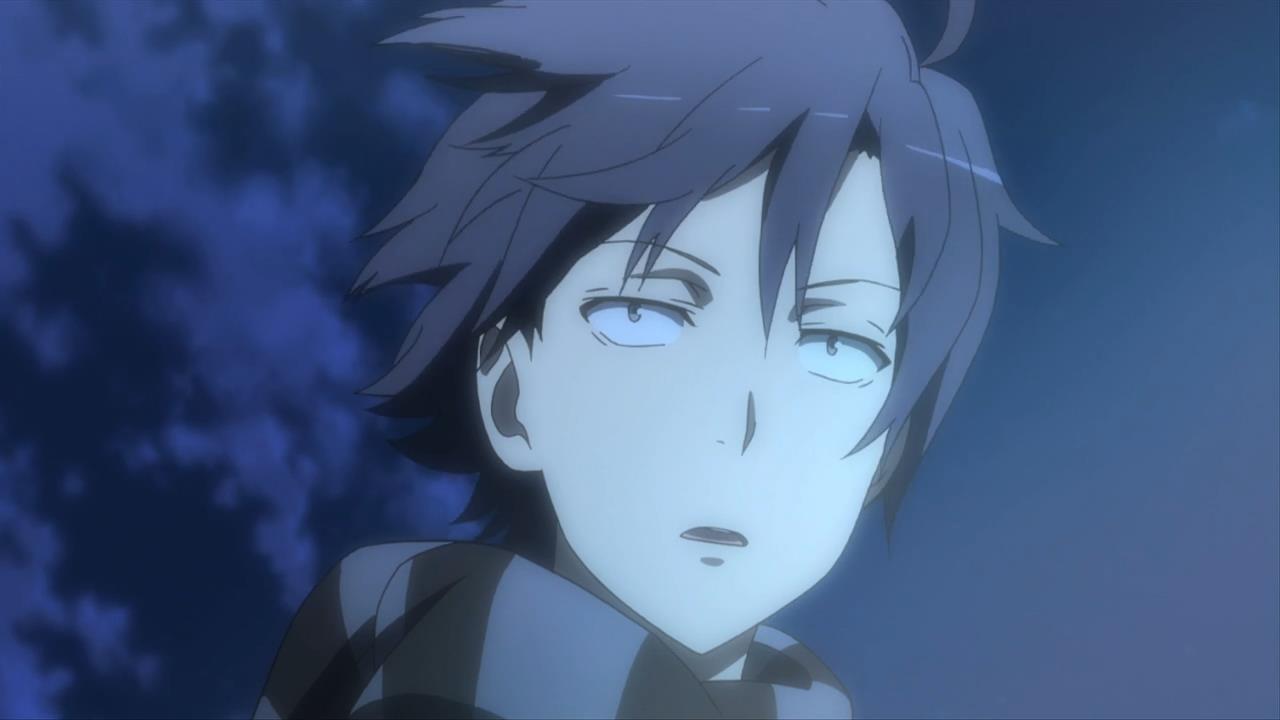
Shizuka saw this as a good opportunity to guide Hachiman into what she wanted Hachiman to think about. She commented that although Hachiman perceived others’ mental states well, he had no understanding of them. Understanding held importance because this explains why people act in a seemingly illogical way. This was why Hachiman, Yukino and Yui came to the wrong conclusions as well, as Shizuka explained in her pivot to the Service Club. Hachiman tried to divert back to the Christmas Festival. He was not talking about the Service Club. But Shizuka in her question, referred to Service Club affairs from the start. With that said, in tying both together, Shizuka noted that both hold the same root of the problem; both posed problems of the heart. 81
Hachiman found Shizuka’s words perplexing if not other-worldly, as if there existed an entirely plane of existence of which he held no awareness. He thought that feelings cannot be a matter to be understood by thinking about them and expressed this to Shizuka. Shizuka demurred. To her, she saw that Hachiman did not understand human emotions yet. She proposed that Hachiman think harder on the matter. If he could only calculate, then do so by process of elimination until one answer remained. This would be what Hachiman failed to notice. This would be Hachiman’s solution to his problem of emotion. Even with this information, Hachiman still did not understand. Shizuka saw that Hachiman either miscalculated his situation or otherwise missed a detail, in which case, her solution was to re-cogitate. Hachiman expressed incredulously that this sounded like madness. Shizuka responded in kind: she called him an idiot and exclaimed that if emotions could truly be calculated that someone would have digitized them by now. Ergo, human emotion emerged as the answer because of its incalculability. 82
Shizuka turned the conversation to a more personal tone that illuminated things about both herself and Hachiman. She related her point about human emotion as an incalculable entity because her miscalculating prevented her from finding a husband. Hachiman retorted that Shizuka overcomplicated the situation: the men that Shizuka knew had lousy taste. This touched Shizuka. Not only did Hachiman seemingly give Shizuka a different angle to her problem, but in a twist of irony where Hachiman’s and Shizuka’s roles switched, confirmed her own thesis―that he either miscalculated or missed a detail―in her own person. 83
In return, Shizuka gave Hachiman a hint for how to avoid miscalculations or oversights in understanding emotions. She told Hachiman not to target the wrong issue in emotions. Applying this to Hachiman’s troubles, Shizuka focused on the reason why Hachiman helped Iroha in his own capacity and not as a Service Club member. Shizuka knew Hachiman did it for the sake of the Service Club, or rather for the sake of Yukino. To Shizuka this followed obviously because of Yukino’s report to Shizuka post-election. Yukino said nothing of the matter but her actions belied her troubles. Thus, Yukino reacted by distancing herself from Hachiman. Shizuka inquired if Hachiman acted similarly. Squeamish about this matter, Hachiman expressed an ignorance about these actions. Sensing sensitivity on the matter, Shizuka believed that Yukino and Hachiman, if both had the same thing in mind, would hypothetically spare each other from harm by distancing themselves from each other. Hachiman affirmed this, hypothetically. 84
Shizuka started the crumbling of the plot’s subtext by moving into what Hachiman could do going forward. For Hachiman, simple concern for harming others, and all the fruits from this concern, were wrong. Shizuka directed him toward thinking about why he wanted to avoid harming others, which she expected would come to Hachiman immediately. Hachiman wanted to avoid harm because everyone in the Service Club―Yukino and Yui―held an importance to him and that the club itself held importance to him. 85
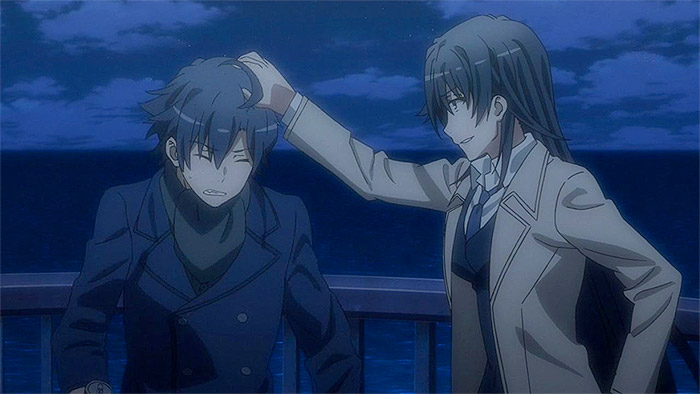
In pressing the initiative, Shizuka gave a thought that struck a resonant dissonance that held interesting philosophical implications. Her reassurance to Hachiman carried the working premise that refraining from hurting someone was impossible. The simple act of existence harmed another. This harm continued into perpetuity. Involvement in another’s life may cause harm, but non-involvement may harm people too. But none of this mattered if the person harmed is not known. Awareness of another held the importance because it served as the gateway to care for another. Once someone cared for another, he will feel like he harmed them. For someone to care for another was to be resolved that that person will harm the other. Thus, Shizuka provided her hint to Hachiman. 86
From here, Shizuka saw fit to expound on the effects, meaning and potential consequences of any decisions made in this moment. For Shizuka, the more people care for each other, paradoxically, the more out-of-reach emotions and reality became. Of even greater paradox: this was not something to mourn, but rather celebrate. Hachiman, in trying to conceptualize all this information, inquired as to whether this proved difficult. This Shizuka affirmed but added that he could accomplish the challenge, because she did. 87
Interrogating this further, Hachiman thought this an arrogant conclusion. In exposing more of the picture, Shizuka noted that likely, Yukino and Yui do not need to be reached by Hachiman. Yukino and Yui could change on their own or someone else could appear in their lives that understood them and can enter into their psyche. Hachiman found this perplexing. Shizuka related to Hachiman in his stage of life, in that she saw that he felt as if everything that could occur in life was occurring, which she flatly quashed. There clearly remained so much more life to live and experience. Even so, eventually, things would come to a balance. 88
In a hopeful shift, Shizuka expressed the hope that Hachiman with Yui can reach Yukino’s psyche. Hachiman felt more informed but still did not know how to breach the wall that was Yukino’s mind. Shizuka urged Hachiman: the moment may not be everything but there were instances where things can only be achieved in an instantaneous flash. Now came the moment for Hachiman, or it would be lost forever. Shizuka bid Hachiman to think, to writhe, to struggle and to worry, else it would not be genuine, it would not be a real relationship for Hachiman. In her closing, Shizuka provided the grand, new charter for Hachiman to plot his course from his and the Service Club’s underworld and back to life. 89
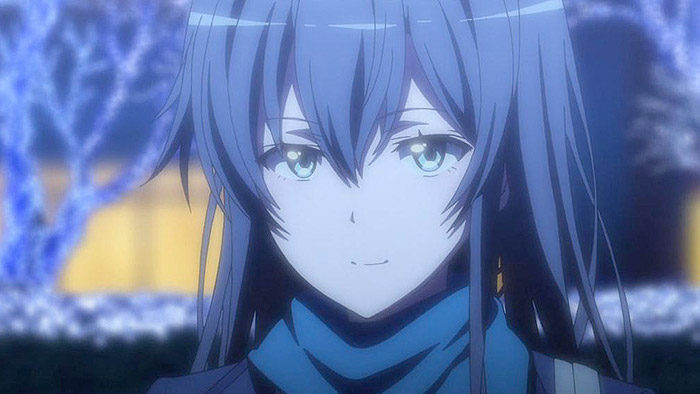
In order to accomplish this, Hachiman first had to endure the final, greatest mental pains of his underworld. This occupied his time for the entire night until the rising sun shone upon him. Hachiman’s immediate issue remained the Christmas Festival, but Iroha and and Rumi both were involved as well. He needed to find an ideal solution to all three of these things in order to have emotional resolution. Try as he might, he could not reverse the downward spiral alone. From here, Hachiman considered if he needed help. His thoughts rapidly jumped from if he needed help to why he needed to turn to others for help and immediately depended on others. He then felt that connections between people became a narcotic for him, that before he realized it, human connections had him hooked. 90
These human connections also provided him with excuses for him to maneuver in order for him to gain the results he wanted. When he rigged the election for Iroha to gain the presidency, Komachi gave him an excuse to involve himself. He said that his involvement was for Komachi’s sake, then made his end-run to his goal and said nothing more of the matter. Hachiman now reconsidered whether he did the right thing. His methods held as wrong then. The way he operated in his strife with everything―the Christmas Festival, the Service Club, his relations with Yukino and Yui, et cetera―held as wrong too. Hachiman believed that he needed his own reasons from his first principles to act: only then could he act, for it would be the right act, for the right reasons, with the right result. 91
From this, he backtracked to the election affair. He did not want either Yukino or Yui to become Student Council President, and Hachiman made this clear to all in his actions. What remained unknown was why Hachiman did not want Yukino or Yui to assume the presidency. As it turned out, not even Hachiman considered his true motives. Upon reflection, he concluded that he wanted something, and that Yukino, Yui or both could help him gain it. But what this ‘something’ was Hachiman had not considered. But by the time Hachiman developed this thread of thought this deeply, the sun had risen, with its luminous beams impregnating the sky with its morning red hue. 92
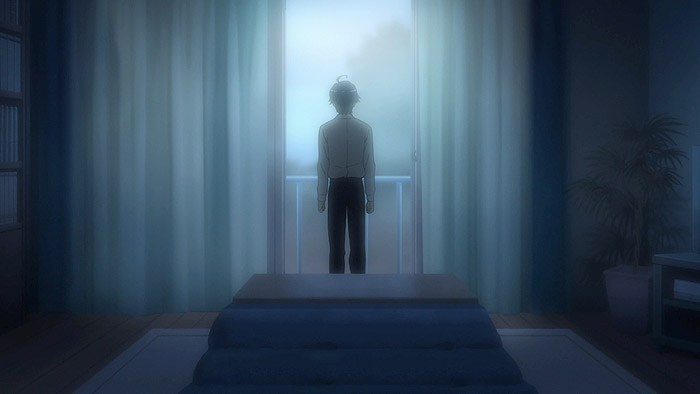
That morning, Hachiman seemed determined on action, but still lacked all the details on how to execute on this desire. He also lacked the willpower to start the conversation necessary to put his hitherto-unknown wishes to effect. He knocked the Service Club’s classroom door. Yukino gave permission to the knocker to enter. To both Yukino and Yui’s shock, Hachiman entered. She gave a chilly reception. Yukino made clear that she told him not to force himself to attend. Yui looked puzzled because Hachiman knocked. She perceived correctly that Hachiman behaved unlike his normal pattern of behavior. All of this remained of no consequence to Hachiman for the time being: he came to the Service Club because he needed help. 93
Hachiman took a seat and said that he needed Yukino’s and Yui’s help with the Christmas Festival. The lack of progress made in the festival preparation made the festival’s difficulty worse than Hachiman thought. He expressed that he pushed Iroha to become president and that he took this task upon himself in his own capacity. In his plea, Hachiman also noted that the Rumi also became caught up in the festival preparations. Hachiman bringing up Rumi exemplified that even in this critical moment, he still relied on other people to provide his motive for action―the very thing that he noted was wrong in how he operated, and which he knew he had to reverse by putting his own motives and reasons to the fore. Hachiman admitted that all of the blame for these events fell on him and that he made a selfish request. Even so, Hachiman needed help and he wanted the Service Club in Yukino and Yui to help him. 94
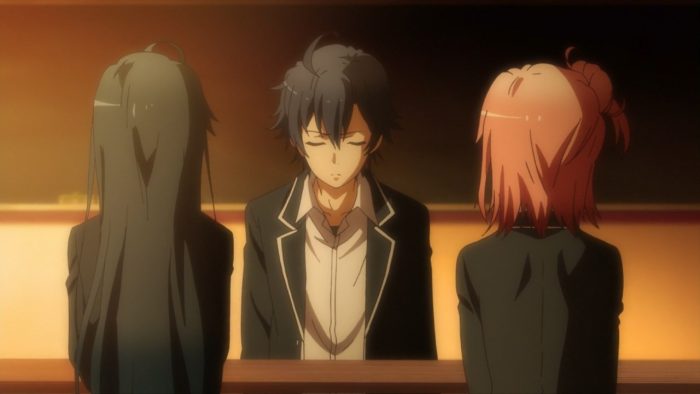
Yukino expressed her calm contempt for Hachiman’s actions, with their relations clearly having better days. After gaining Hachiman’s admissions, she determined that since all of the blame fell on Hachiman, Hachiman should be left to wallow in his own mess. A dejected Hachiman was about to excuse himself and exit the Service Club. Then Yui interjected. She insisted that the blame did not lie solely with him; they all contributed. His initiative, the planning and the initiative may have all fallen on him, but Yui made no effort to stop him or try to lead him in another direction. Neither did Yukino, and Yui made it a point to direct this mention of it to her. Yukino for her part, felt that Yui was being unfair. 95
Hachiman did not want this conversation to transpire. At this point however, Hachiman held no power to direct any conversation in any direction. Yui pressed further on her point: Yukino did not tell her or Hachiman anything about their recent events, and they were unable to help her if Yukino failed to tell them anything. Yukino defended herself. Yui said nothing of the strife either and only made small talk and pleasantries passim in order to keep up appearances. Thus, if Hachiman and Yui wanted this as a relationship, Yukino felt obliged to accommodate this. 96
Hachiman may not have wanted this conversation to start, but once it started, his attitude turned sanguine, as if a weight had been lifted off his shoulders. He commented with a smirking grimace that though expressing thoughts brought a start, even if Yui or Yukino had intervened to prevent him from acting on his own accord, he would not have accepted their help. He would try to find a hidden motive. The grand irony of his thoughts remained that he tried to find hidden motives in other people, not because they were untrustworthy, but because he operated using surreptitious, sneaky motives. 97
Yui preferred to think more optimistically―in the midst of all the rubble of the Service Club’s members’ former relationship―and implored upon Hachiman and Yukino to talk more, for it would avoid and would have avoided all the problems they encountered. Hachiman did not necessarily share that assessment, at least superficially. He thought that to say he understood simply because another told him could only be arrogance, an ego trip for the person who said it and the conceit of the person told. Indeed, no guarantee of understanding can be obtained after things happen, even if discussed. Yui impressed upon Hachiman that she and Yukino had no way to understand him if he did not say anything. 98
Hachiman then connected his writhing on this issue all through the night to the conversation at hand, and indeed everything in his conscious life. In this moment, Hachiman suddenly, fully developed his thoughts of what he desired, what this ‘something’ was. He fully realized that his pursuit of what he thought he wanted and what he truly wanted diverged drastically. He did not want mere words. He did not want friendship of the usual, superficial sort. He did not want mutual understanding. He did not want anything of the sort. And he realized that he always knew it. He did not merely want to be understood, but also to understand, to know and to have ease of mind in knowing. He wanted this knowledge because not knowing struck him with terror. Indeed, he wanted to understand all. He felt that this wish was dictatorial, conceited, shameless, repulsive and extremely self-righteous. Hachiman held disgust for himself for even wanting what he wished. Even so, he knew that his whole relationship with Yukino and Yui held a basis through thrusting his own conscious upon them and vice versa, and that what he wanted could not be achieved―it was impossible―in reality. After this thread of thought raced through Hachiman’s mind, Hachiman exclaimed that he wanted “the real thing.” 99
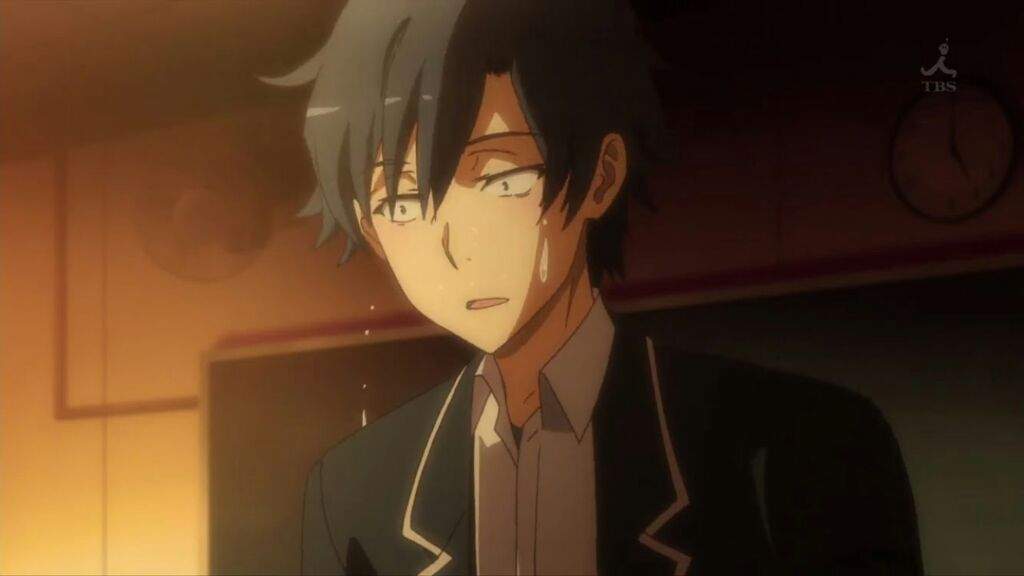
Hachiman’s breath brought his inner desire into real life by his words, freely, for the first time, never to be held back nor stuffed back into his inner psyche again. He made himself vulnerable before Yukino and Yui, and at the mercy of their reactions. Yui appeared speechless but elated that she heard what Hachiman felt truly for the first time. Yukino closed her body off with her arm, said that she did not understand, then ran out of the classroom. Upon seeing this, Yui immediately registered that something terribly wrong befell upon Yukino. She urged Hachiman unto hot pursuit: Yukino made it clear that she knew not what to do. Yui admitted that she did not know either but they all needed at least to try to understand. Things could not end like this. Yui saw this moment as their only chance at gaining it. She never saw Yukino act like this before. Yui repeated her urging; this time she also grabbed Hachiman’s hand. Hachiman withdrew his hand from her grasp and expressed that he can do this by himself, foreshadowing what was to come, but acceded to her urging. Just then, Iroha intervened and expressed that Yukino ran to the school roof. Yui and Hachiman went to the roof and found Yukino there as Iroha said. 100
Yukino’s apparent calm, pensiveness juxtaposed the passionate external turbulence she and her club faced. Upon Hachiman and Yui finding her, Yukino expressed that she did not understand what Hachiman meant by “the real thing.” Notably, as Hachiman was about to answer Yukino, Yui reassured her that this was fine because she did not understand either. In light of Hachiman’s rejection of Yui’s hand, Yui―if only subconsciously―perceived correctly that the conversation would have taken a turn that she would not like. 101
Her intervention stopped more information from gushing out all at once. But this also proved a much-needed, ready salve, in that it helped a mutual understanding which would foster the continued vitality of their relations, manifested in the club and kept the club together in the process. In any event, Yui believed that the more they talked, the more that they would understand. Yui and Yukino probably never would fully understand Hachiman or each other even then. But Yui did not like things the way they remained before. No one did. Both Yukino and Yui embraced, and cried in their reflection of their circumstances. In Hachiman’s request, to have “the real thing,” which incorporated the Christmas Festival, Yukino relented. She acceded to Hachiman’s request, and so did Yui. Hachiman gave his appreciation of this to both Yui and Yukino. 102
Hachiman’s transformation from his less-than-splendid isolation to active involvement in extracurricular affairs demonstrated a rapid character development. In Hachiman’s nine-month Odyssey, he had taken a relationship with total strangers and transformed it to a solid deep friendship through professional club involvement. This ability to form friendships was not limited to his insular world of the Service Club. Hachiman demonstrated an ability to form new friendships and restore old ones. He learned how to deal with people toward whom he held animadversions. Most importantly, he transformed his relations with authority figures. Shizuka initially saw him as a problem child who gave no cooperation or any sign of civilization. Hachiman, from the Culture Festival onward became teacher’s pet.
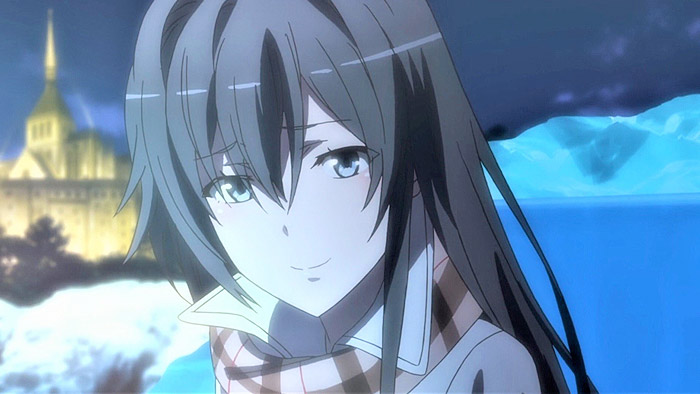
In the immediate aftermath, Hachiman’s request for his relationship having “the real thing” proved to be the new charter of vitality for the Service Club. The Service Club reinvigorated the Student Council to block any further maneuvers from Tamanawa, and save the Christmas Festival, just as the Service Club had reinvigorated and saved themselves. 103 Further, the Service Club, in visiting a theme park to decompress from their recent strife, strengthened and formalized their new-found amity. The highlight proved Yukino requesting to Hachiman, to “save her someday,” as it foreshadowed Yukino’s―and Hachiman’s―happy future. 104
Works Cited
- YAHARI ORE NO SEISHUN RABUKOME WA MACHIGATTEIRU (やはり俺の青春ラブコメはまちがっている), CRUNCHYROLL (Feel, Inc. 2020 (Season 3); Feel, Inc. 2015 (Season 2); Brain’s Base Co., Ltd. 2013 (Season 1)), passim, https://www.crunchyroll.com/my-teen-romantic-comedy-snafu (hereinafter OreGairu). The translations are provided by the same Crunchyroll. This particular reference is not directed toward a specific episode but is passim throughout the first two seasons. All episodes are located from the link provided and will be taken from this source and will refer simply to the season and episode in abbreviated form instead of the title for reader convenience and brevity. For similar reasons, the material shall also show the studio that produced the material and the year of publication instead of the original television channel and date broadcast. ↩
- OreGairu: S. I, Ep. 2 (Brain’s Base Co., Ltd. 2013). ↩
- See, e.g., OreGairu: S. II, Ep. 3 (Feel, Inc. 2015). ↩
- Compare OreGairu: S. I, Ep. 2 (Brain’s Base Co., Ltd. 2013), with OreGairu: S. II, Ep. 3 (Feel, Inc. 2015). ↩
- Ibid. ↩
- C.f., OreGairu: S. I, Ep. 1 (Brain’s Base Co., Ltd. 2013); OreGairu: S. I, Ep. 2 (Brain’s Base Co., Ltd. 2013); OreGairu: S. II, Ep. 3 (Feel, Inc. 2015). ↩
- See OreGairu: S. I, Ep. 5 (Brain’s Base Co., Ltd. 2013); OreGairu: S. II, Ep. 8 (Feel, Inc. 2015). ↩
- See, e.g., OreGairu: S. I, Ep. 5 (Brain’s Base Co., Ltd. 2013). Hachiman pieced together his hidden-motive puzzle in the infamous eighth episode of the second season. See OreGairu: S. II, Ep. 8 (Feel, Inc. 2015). ↩
- SeeOreGairu: S. I, Ep. 2 (Brain’s Base Co., Ltd. 2013). ↩
- See, e.g., OreGairu: S. I, Ep. 1 (Brain’s Base Co., Ltd. 2013). ↩
- OreGairu: S. I, Ep. 7 (Brain’s Base Co., Ltd. 2013). ↩
- OreGairu: S. I, Ep. 8 (Brain’s Base Co., Ltd. 2013). ↩
- E.g., OreGairu: S. I, Ep. 5 (Brain’s Base Co., Ltd. 2013). ↩
- Ibid.; OreGairu: S. I, Ep. 8 (Brain’s Base Co., Ltd. 2013). ↩
- OreGairu: S. I, Ep. 5 (Brain’s Base Co., Ltd. 2013). ↩
- Ibid.; OreGairu: S. I, Ep. 6 (Brain’s Base Co., Ltd. 2013). ↩
- OreGairu: S. I, Ep. 6 (Brain’s Base Co., Ltd. 2013). ↩
- See OreGairu: S. I, Ep. 1 (Brain’s Base Co., Ltd. 2013). ↩
- Ibid. ↩
- SeeOreGairu: S. I, Ep. 6 (Brain’s Base Co., Ltd. 2013). ↩
- See Ibid. ↩
- See Ibid. ↩
- Ibid. ↩
- OreGairu: S. I, Ep. 10 (Brain’s Base Co., Ltd. 2013). ↩
- OreGairu: S. I, Ep. 11 (Brain’s Base Co., Ltd. 2013). ↩
- Hito (人) means “man” or “person” in Japanese. ↩
- OreGairu: S. I, Ep. 11 (Brain’s Base Co., Ltd. 2013). ↩
- OreGairu: S. I, Ep. 12 (Brain’s Base Co., Ltd. 2013). ↩
- See Ibid. ↩
- Ibid. ↩
- See Ibid.; c.f. OreGairu: S. II, Ep. 8 (Feel, Inc. 2015). ↩
- See OreGairu: S. I, Ep. 12 (Brain’s Base Co., Ltd. 2013). ↩
- OreGairu: S. I, Ep. 1 (Brain’s Base Co., Ltd. 2013). ↩
- See, e.g., OreGairu: S. I, Ep. 6 (Brain’s Base Co., Ltd. 2013). ↩
- See OreGairu: S. I, Ep. 11 (Brain’s Base Co., Ltd. 2013). ↩
- See OreGairu: S. I, Ep. 12 (Brain’s Base Co., Ltd. 2013). ↩
- OreGairu: S. II, Ep. 1 (Feel, Inc. 2015). ↩
- See OreGairu: S. I, Ep. 5 (Brain’s Base Co., Ltd. 2013). ↩
- OreGairu: S. I, Ep. 9 (Brain’s Base Co., Ltd. 2013). ↩
- E.g., OreGairu: S. I, Ep. 11 (Brain’s Base Co., Ltd. 2013). ↩
- OreGairu: S. II, Ep. 1 (Feel, Inc. 2015). ↩
- OreGairu: S. II, Ep. 2 (Feel, Inc. 2015). ↩
- Ibid. ↩
- Ibid. ↩
- Ibid. ↩
- Ibid. ↩
- See Ibid. See also OreGairu: S. I, Ep. 12 (Brain’s Base Co., Ltd. 2013). ↩
- See OreGairu: S. II, Ep. 2 (Feel, Inc. 2015). See also OreGairu: S. I, Ep. 11 (Brain’s Base Co., Ltd. 2013). The idea of Yukino’s feelings came from Louisa Ackermann, Is Yukino in love with Hachiman?, QUORA (updated Aug, 9, 2020), https://www.quora.com/Is-Yukino-in-love-with-Hachiman (last visited Sept. 23, 2020). ↩
- OreGairu: S. II, Ep. 2 (Feel, Inc. 2015). ↩
- See Ibid. ↩
- SeeOreGairu: S. II, Ep. 3 (Feel, Inc. 2015). ↩
- Compare OreGairu: S. II, Ep. 1 (Feel, Inc. 2015), with OreGairu: S. II, Ep. 3 (Feel, Inc. 2015). ↩
- OreGairu: S. II, Ep. 3 (Feel, Inc. 2015). ↩
- Ibid. ↩
- Ibid. ↩
- Ibid. ↩
- Compare OreGairu: S. II, Ep. 2 (Feel, Inc. 2015), with OreGairu: S. II, Ep. 3 (Feel, Inc. 2015). ↩
- See OreGairu: S. II, Ep. 3 (Feel, Inc. 2015). ↩
- Ibid. ↩
- OreGairu: S. II, Ep. 4 (Feel, Inc. 2015). ↩
- Ibid. ↩
- See Ibid. ↩
- Compare OreGairu: S. II, Ep. 4 (Feel, Inc. 2015), with OreGairu: S. II, Ep. 5 (Feel, Inc. 2015). ↩
- OreGairu: S. II, Ep. 5 (Feel, Inc. 2015). ↩
- Ibid. ↩
- Ibid. ↩
- Ibid. ↩
- Ibid. ↩
- See Ibid. ↩
- CompareOreGairu: S. II, Ep. 3 (Feel, Inc. 2015), withOreGairu: S. II, Ep. 5 (Feel, Inc. 2015), and OreGairu: S. II, Ep. 6 (Feel, Inc. 2015). ↩
- OreGairu: S. II, Ep. 6 (Feel, Inc. 2015). ↩
- See Ibid. ↩
- Ibid. ↩
- OreGairu: S. II, Ep. 7 (Feel, Inc. 2015). ↩
- Ibid. ↩
- Ibid. ↩
- See Ibid. ↩
- See OreGairu: S. II, Ep. 8 (Feel, Inc. 2015). ↩
- Compare Ibid., with, e.g., OreGairu: S. II, Ep. 2 (Feel, Inc. 2015), andOreGairu: S. II, Ep. 7 (Feel, Inc. 2015). ↩
- OreGairu: S. II, Ep. 8 (Feel, Inc. 2015). ↩
- Ibid. ↩
- Ibid. ↩
- Ibid. ↩
- Ibid. ↩
- Ibid. ↩
- Ibid. ↩
- Ibid. ↩
- Ibid ↩
- See Ibid. ↩
- Ibid. ↩
- See Ibid. ↩
- See Ibid. ↩
- Ibid. ↩
- See Ibid. ↩
- Ibid. ↩
- Ibid. ↩
- See Ibid. ↩
- Ibid. ↩
- Ibid. ↩
- See Ibid. See also OreGairu: S. III, Ep. 11 (Feel, Inc. 2020). ↩
- See OreGairu: S. II, Ep. 8 (Feel, Inc. 2015). ↩
- See Ibid. ↩
- See OreGairu: S. II, Ep. 10 (Feel, Inc. 2015). ↩
- See OreGairu: S. II, Ep. 9 (Feel, Inc. 2015). See also OreGairu: S. III, Ep. 11 (Feel, Inc. 2020). ↩
What do you think? Leave a comment.




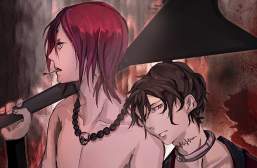
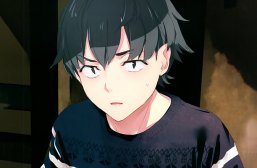

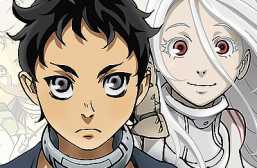
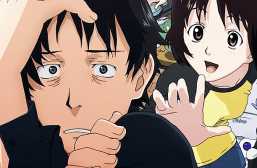
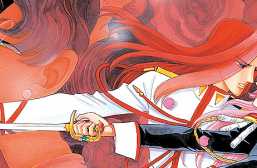
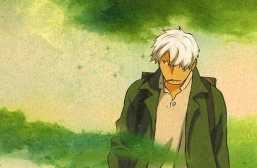
This is *amazingly* thorough…and yet more evidence that anime kicks Western animation’s butt in terms of complexity and themes.
Thanks! I will say that OreGairu is a uniquely deep anime, and from what I have read, the original light novel is even deeper than that and has more details than the anime.
MORE details? Whew, when did the author have time to sleep? But seriously, cool.
Thanks Stephanie!
I first started watching oregairu without noticing the values it has and how it fits my own life. Damn, i really want to rewatch the whole series.
I would encourage it. OrGairu has a specialness that few works of art do: that anybody could watch it and understand what is going on superficially and recognize it as good, but the more you understand and analyze, the better it gets.
My second favourite anime. While watching it I realised how complex it felt and was annoyed at my self for not fully taking in the dialogue and trying to interpret what it all meant.
This article makes me appreciate Hachiman even more as a character even though I already loved his character. I think the way the story goes I didn’t truly take in the dialogue because of the comedic aspect of the show, your article made me realise how deep Oregairu really is and appreciate the complexity of it. I’m currently reading the Light novels so after I read a number of them I’ll watch the show again and really try and take it all in.
I probably should get a hold of some of them and get better at Japanese while I’m at it.
I think people don’t realize, Hikki’s world view is most likely the authors world view. It’s why the author was able to paint such a picture with words that had a thousand meanings behind them, probably because the author felt this way and wanted to project it onto a character. I truthfully honestly admire this author because most likely this thought process was similar or just was his own.
It is said that the best authors have a deep understanding on the human psych, so that would not surprise me.
I highly recommend a Oregairu/Game of Thrones crossover fanfic by Icura, entitled ‘My Teen Romantic Comedy is now a Medieval Political Fantasy.’ Like the Oregairu anime, it does not try to glorify or justify Hachiman’s actions.
Interesting.
I throughly enjoyed this character analysis, it feels like a thorough comprehension on Hachiman’s psyche and it also helped me understand as to why I really relate to his character.
While not meet with the rejection Hachiman has went through (didn’t even have the courage to ask a girl out) I feel as if I could’ve end up on a similar path he went through. Though I did go through something similar. During elementary school I desired that “best friend” or “girlfriend” that would have this special bond with me.
It resulted in me appearing clingy, thus resulted in me being granted the title stalker. People saw me as estranged and eccentric, which resulted in me being alone all the time. I recall this one moment where this guy went up to me and specifically called me out on my desire for a deep bond with someone, they called me a stalker for always wanting to be around that individual. At this point I thought my company was undesired and my presence a burden. I believed that people wanted to avoid me, so I did the thing that I thought would please them, I’d just completely ghosted them, avoiding all interactions on the play ground going to the edge of the playground were it was only me, myself, and I. This went on to highschool where i started to change and developed into the person I am today. I recall over reading into stuff all the time, like this one time during middle school where this girl I liked called my name during popcorn reading (was during middle school, the only people who weren’t called were me and this other guy with the same name) and she looked in my direction and answered in a somewhat anxious tone. We kinda knew each other durring elementary school but not as intimate as I would’ve liked. Since then I was reading it as she might like me too, not to mention that during elementary school when she had a hobby of drawing anime girls and not guys, one of her friends ask why not draw me and her response was “EW” but I not total disgust, though I could be remembering it wrong.
Anyways a couple years later my biology teacher said that when a girl acts defensively as such, they like you. Basically conforming Tsunderes. At this point it got me reading those situations as signs she might like me, though I doubt it now due to the fact she might be a lesbian thanks to her Facebook page that was recommended to me recently thanks for friends knowing friends. Anyways I went on a long tangent, i originally was just gonna say thanks for the amazing read.
You’re most welcome, and thanks for providing a window into your life!
I think he suffers from melancholy.
Possibly among many things…
The odd thing about this show is that, for some reason, the main character in the beginning reminds of some kid I used to know. Their way of pointing out what’s wrong in others might be the culprit, as well as their tendencies to keep their distance from others, preferring solitude. Moreover, they both deviate from social norms in a eerily similar manner. Anyway, great work!
You’re welcome! That might be because Hachiman represents a dark archetype of a particular personality.
Thank you for the character analysis. I love this anime and it’s finally over. Thank God Hachiman found the genuine relationship that he longed for all this time.
You’re welcome. There might be some development of Hachiman’s relationship in the OreGairu OVA.
This is my favorite anime all-time just cause of Hikigari. Great final season.
It was, but not for certain characters…
Fantastic article. Well analysed and well stated.
Thanks! I appreciate it.
Crazy how the show had almost nothing at stake but still managed to create so much interesting drama.
This might be because of the framing. As Shizuoka impliedly pointed out, the reason for all the drama is because it feels like everything to those of Hachiman’s age.
A good take on Hachiman’s character. It’s really sad to see someone as pure hearted as Hachiman fool themselves into thinking there a cynic when in reality the thing they want most in life is to help others.
There is a surprisingly common paradox here: the thought that you are precisely what you are not or that which you are the weakest at.
I love Oregairu because of how it made me feel. The first season was good and I enjoyed it but the second season basically made me go through the entire range of teenage emotion in 13 episodes and by the end of it I had a better grasp of what I wanted.
As a loner myself (also because of circumstance) I understand Hachiman and honestly I feel guilty since my entire “personality” is a facade, a mask to deceive others so that they won’t pity me. And yet deep down I search for someone who will care enough to look through the mask and when they see the real me will still care enough to be with me, not out of pity but out of genuine affection.
The second season does have that effect on others. For your self-masking, see Season 3 (hint: Hachiman’s mask comes off).
One of the key factors of the narrative is how much of a hypocrite Hachiman can be, he will go as far as destroy some social connections to affirm his opinions. It is not healthy to consistently for this, but at least Hachiman is honest about it. So over time, I think of when people find out how much he can care for others, it makes him stick out to his associates. I can see why Yukino and Yui are attracted to him. If one really makes a genuine effort to act with him, he will return the favor.
I think the attraction on both Yukino and (to some extent) Yui’s parts comes from Hachiman’s particular intelligence. This does play a role in the plot going forward.
I think if Hachiman keeps a healthy balance between his narcissistic behavior and his new found INFJ personality he can be a great addition to society in that same fictional world. Funny thing is the same could be said about the real world. Sometimes people need to be heavily criticized by people like Hachiman to reflect and improve themselves. I would say a big part of why Hachiman changed so much throughout both seasons is because of Yukinoshita Yukino. She was the trigger for Hachiman’s self improvement.
He set these expectations/assumptions on her and when he noticed for the 1st time Yukino going sort of out character, he started to question himself and his beliefs, and finally recognizing he might’ve been wrong when he says: “I hate myself”.
I do take the general point that you make, that Hachiman advances himself when he starts developing more of his psychological functions, his shadow functions particularly, though I would type him more as an INTJ.
Wow. This guy sounds a lot like me. I also have trouble trusting others and tend to self isolate to avoid being burned by others. I’d like to be kind and trusting I’ve learned doing so tends to result in betrayal. Even with the few positive relationships in my life I often wonder how long they will last.
I have noticed that quite a few people both here in the comments section and in other places have make similar comments on their own lives. This seems to reveal something about the anime.
I love this anime but I also hate it.
How can you both love and hate the anime?
Oregairu is an anime that made me actually think a lot of the story. Will always remain in my heart forever. Thank you a lot for covering it.
I appreciate it. Thank you!
I strongly was able to relate to Hachiman watching the show, because he is incapable of normal connection with people just like I.
I still am not able to have a fully normal connection with other people, but I definitely have come way closer to it, as I have actually told several people I trust about my problems for example. Also I have become close friends with two people who are extremely important and dear to me, while instead of just surviving one day after another for most of my life I am finally actually truly enjoying life and living it.
Anyway, thank you for the writing.
No problem! You’re welcome. Also as a pro tip: the more developed OreGairu gets, the more Hachiman questions why he has the issues he has and the more he unravels his own psyche.
The anime has finally ended. It was a long journey, some had to wait for 5-7 years to see Hachiman get his “genuine”. Thank you Hachiman, Yukino and Yui. You guys will always have a place in my heart.
Thanks for the touching sentiments toward the anime.
Hachiman makes me cringe all throughout the series. Just my opinion. It’s starting to become a irrational hatred for his character tbh, since it’s in my nature to want to be “different”.
I don’t think I have come to that kind of intense dislike, but I do agree that some of the Hachiman scenes are difficult to watch because it causes a (fully intentional on the part of the creator) discomfort. It also does channel some of what Yui and Yukon’s particularly were feeling in the second season.
Read the light novel if you enjoyed the anime, I was and I m still touched by Hachiman. The LN gives you a better prospect of how he actually is.
I have heard the same thing. It is something I wish to do at some point.
Hachiman is one of my favourite characters because even when he is a good person, he can almost always expose the true nature of people (minus some exceptions when he misjudges) and his life philosophy is very close to mine: don´t expect anything from anybody. But at the same time, he never says no to a person in need.
Indeed, it seems that his character progression tracks closely with finding the true nature of particular individuals. It does provide an instrument to develop the plot.
Just finished watching season 2 like, a minute ago and came to The Artifice and found this! Loved this show so much! It’s such a thought-provoking, meaningful little story. Rich with characters.
Good to know that the anime evokes so much from you!
Just started binge watching this show… perfect post to read after.
Thanks for the compliment!
In my opinion, Hachiman has a sadistic, perhaps even borderline psychopathic side to him that was most prominently displayed when he psychologically tormented Sagami. I see a lot of Rust Cohle from True Detective in Hachiman. I think he would make a great investigator.
He does some investigative work in the second and particularly the third season, so you may not be too far off there.
I think you missed the entire plot, sagami’s demise was inevitable, if hachiman never said such thing, the whole school society will definitely do that in place of him, by being brutally honest he save sagami from harsh school’s comments and put himself under the bus.
I did allow that inference to be drawn but I don’t think I missed it. Also, I think it is a mischaracterization to classify Safari breaking down (one detail) as the whole plot, particularly since the main thrust is how Hachiman, the protagonist, develops as a character.
Man, i really wanted hikki to end up with yui. I always hated that the softest one has to accept the hardest thing (in here , she has to accept that hikki would choose yuki). Her breakdown moments where she cried and her mother comfort her is the saddest part.
I do see some perks with a Hachiman-Yui pairing, and it wouldn’t necessarily be a bad one. Having said that, I do think Yui’s gregarious nature would have clashed with Hachiman’s more solitary nature at some point. Perhaps if he adapted more and overcame that hurdle, it would have been a better pairing. Yukino’s advantage as applied to Hachiman is that both are loners in their own ways. Hachiman would not have the kind of personality clash that he would have with Yui, and he gets more interpersonal benefits up front with Yukino, particularly after he develops to a sufficient extent at the end of Season 3. Thus, to me, with no disrespect intended to Yui, it looks to me like Yukino is the better mate for Hachiman. Just a thought; feel free to disagree.
You feel that Yui would’ve been the more suitable choice?
No; though I feel that Yui has some perks for Hachiman that Yukino doesn’t provide, overall, I think Yukino would still be the superior choice for Hachiman (see my comment just above yours).
No anime makes me feel the way oregairu does, how does it not have the “psychological” tag I do not know.
Unfortunately, I didn’t think of it at the time and I filled up the tags with things that were anime-related. There is quite a bit of psychological development, though so good observation!
Thank you for really putting everything into perspective and bringing it down to earth for us, even though I did understand the underlying meaning behind Hachiman, because I watched this anime 3 times now in the last month.
And the second time round I starting to grasp what was being conveyed, and I really praise this anime, it showed the harsh truth about people who wear masks everyday to ‘fit in’, and the people who are too scared to be hurt, and succumb to fear in everyday interactions.
There are certain works that act such that the more times and the more you read, watch or listen to those works, the more nuanced meaning you gain from it. OreGairu is one of those works.
You accurately described this character. I think almost any of us can relate to how he feels this anime really describes how hard it is to rely on someone.
I appreciate the comment because that was my main aim in the article. Thanks!
Blame Hachiman parents for not helping him or advising him to the right direction.
Hard to do this because:
1. We never see them;
2. We don’t have these flaws in Komachi.
Just a thought.
What’s really sad about Hachiman’s story is how us watchers/readers relate to him and love him so dearly, while most people in his world don’t like him. Only those who took the time to get to know him, either by talking to him or us by experiencing the story through his perspective, like him.
It’s soul-crushing how Hachiman doesn’t see the worth he has, but at the same time, the strength he has built up is inspiring.
Yukino, Yui and Shizuka do come to like him, and in that sense take the same place as the spectator, because they end up relating to him in the same way. Thanks for the comment!
My 3 favorite anime protagonists: Shirou Emiya, Hikigaya Hachiman and Suzuki Satoru aka. Ainz Ooal Gown.
Interesting that you would pick Ainz; I would have figured him to be an antagonist.
Real life is even worse than the world of oregairu, because at least for me, even when I develop the courage to approach people and talk to people, I still get shit on no matter how much I do.
For the first few months in uni, I forced myself to talk to people. I was the one talking the most, approaching people, saying yes to everything and going to societies. I talked to everyone with confidence, a smile, made jokes, asked people questions and was interested in what they were saying. Yet, nothing happened. No one was interested in hanging out with me, the only person that did was someone else who couldn’t make any other friends, but in the end we will hung out with eachother out of desperation so it inevitably fell apart. During that time I felt like Yuigahama more than Hachiman, which for me, felt even worse than living like Hachiman. Spending all my time getting burnt. So I guess I’m just gonna have to pick the lesser of two evils.
Your description of your life does resemble Yui. Sorry for the difficulties you’ve had. Hope things get better!
I just want to point out that I really enjoy the way in which you write, even though I am unfamiliar with the anime that you are discussing!
I appreciate the high compliment Samantha. Thank you!
When people don’t understand that he grew up without emotional support as a child while being bullied for being different from others (not his eyes, those came in/after middle school). It eventually shackled him to be a better person all around, not just at his core, his and Yukinoshita’s places could be switched so easily.
This is very much alluded to in the anime; from what I hear more in the LN. He and Yukino indeed could have, and that is part of what makes them effective foils for each other.
Very relatable character and anime. This was my highschool life. Middle school was hell for me. High school I kept everyone at a distance. Last year I opened up and had a great group of friends. But there was a conflict in relationships. I didn’t want to ruin my friendship within the group. Despite nearly letting those feelings out. She is devoiced now and everyone went their own ways. My self one failed engagement several failed relationships. It’s just made me that much harder to get to know or let feelings out.
Sorry to hear of your difficulties. Hope you have more success in future. For any useful hints, see Season 3.
His main problem is that he imagined his problem. He make up “true friendship” as an only way to make friends. There are no true friendship – every relationship(friends, lovers, etc) is created on base that both sides must receive some benefits from relation.
I would say that his problem was not so much imagined as self-misdiagnosed, but I can otherwise concur in your observation.
To be honest, Oregairu is the only anime which I can fully relate when it comes to seeing society with realistic disgust. It’s because ever since I was a kid, I was a loner too like Hikigaya. I’m always being bullied to the point that I was once an optimistic otaku then turn to a suicidal and pessimistic otaku. Ever since the first episode, I didn’t expect that this anime would ever placed somewhere special in my heart.
Yes, this does sound like a spicier version of Hachiman’s life from the beginning. Thanks for sharing!
Thank you so much for this, I finished this anime in two days and all I wanted is a complete break down of Hachiman’s character because I think hes one of the most complicated anime characters I have ever seen. 100% on point analysis.
You’re welcome! And thank you so much for your kind words and feedback. I truly appreciate it!
At one point in my life i genuinely thought I’m living like Hachiman even with 2 female friends. But now a year past by after we graduated from the uni we rarely in contact.
It happens. There is a realism to the anime in that we start to notice similarities in our own lives.
I’m not afraid to take risks but the risks I take mostly end up in a failure. I don’t blame him for being so self reserved to a point where he contemplates if he deserves the happiness that is in front of him because it does hurt and it can leave scars. As humans we can’t stay in a stand still. We can’t stay cooped up and think that that’s enough. We can’t keep pushing people away and think that everything and everyone is a trip mine. And we can’t keep lying to ourselves.
Some of the many lessons to be learned from the anime.
I used to compare my self to hachiman years ago, But im actually like yuigahama from season 1.
Hachiman also has a difficult home life. His parents boardline neglect him and his father seems to dislike him. That’s from the LN though.
Yet another reason I should read the light novel. Apparently, Yukino had certain interpersonal difficulties in the LN as well, but with her classmates. This is where her relations with Hayato have more context.
Interesting. If you don’t mind me asking, in what way? Hesitancy in saying something that could upset another? Trying to be a people-pleaser? Something else?
I don’t want to spoil it. I really recommend reading the LN.
This is something that I want to do. I am aware that there are more details in the light novel, and would make it worthwhile on that basis alone given that the anime itself is packed with subtle details.
I can relate with him a lot. Unfortunately.
I think most everyone can relate to him on some level, and if not him, Yukino or Yui.
When I saw the scene on Oregairu S3 episode 1 when Komachi sincerely thanked Hachiman and made him teary, I also have been teary in him seeing him developing now rapidly.
Season 3 does drive forth to the conclusion very decisively. This scene between Komachi and Hachiman is but the tip of the iceberg. Look at the relations between Hachiman, Yukino and Yui…
Ive watched this show through several times and each time i get somthing new out of it.
Same here. I believe I have watched this at least three times through for both the first and second seasons, looked at certain details with greater scrutiny where I had questions and took extensive notes on the first two seasons the last time I watched it. It is a hallmark of a good work that the more one examines a thing, the more meaningful it gets.
Hikigaya Hachiman might be my favorite anime character. He is able to do what I can’t do.
Great observation. This is the flip side of Hachiman: where one can relate to his struggles, one can also stand in wider of his abilities in aspiration of the same.
Interesting article!
Thanks!
I kinda relate to this guy. I’m an introvert and I just can’t trust anyone these days especially what my so called friends did to me. If there was any chance for me it died long ago… yet I still hope.
Hope always sprigs eternal. That’s one of the more subtle lessons from Hachiman if you watch Season 3.
I hate it…I hate how I relate to Hachiman so much when watching the show…i despise it…
If you’re relating to Hachiman to a high degree, then the remedy would be taking steps similar to his to ameliorate your woes.
I have wanted to watch this forever!!! It gave a good background and general idea of it.
Thanks for your gracious words! I’m glad you enjoyed the piece.
Hikigaya is hands down one of the most relatable, well-written, and one of the most loveable characters for me.
This would be one of the reasons I analyzed his character.
Thanks for reading!
Now read Oregairu Shin. Last time I checked its destroying all the character development.